#さしばの里
Explore tagged Tumblr posts
Photo
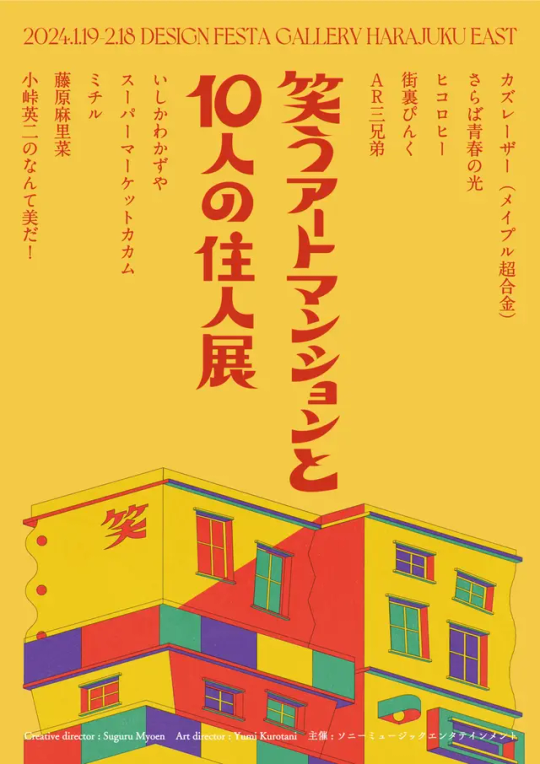
(カズレーザー、さらば青春の光、ヒコロヒーらが参加決定!『小峠英二のなんて美だ!』初のスピンオフ企画展『笑うアートマンションと10人の住人展』開催決定 - Tokyo Nowから)
0 notes
Text
Authentic Japan in Gyakuten Saiban pt. 1
Those who played the Ace Attorney localization know that all the names authentic to Japan were either changed to common ones, or more or less explained by the characters watched movies/TV series and so on.
And what about the original Japanese version?
We encounter the decoration of a Japanese house in 2-2, when we visit the Kurain village. And what is noteworthy is that Naruhodō is well informed about such items and actively comments on each of them.
For starters, the curious name of one of the locations
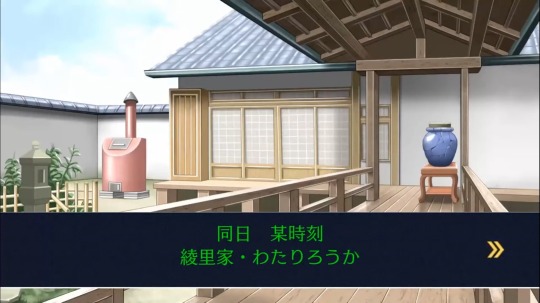
同日 某時刻
綾里家・わたりろうか
Dōjitsu bō jikoku
Ayasato-ka watari rō ka
Same day, at a certain time
Ayasato family, Watarirōka
渡り廊下 (watarirōka) - passage
The word consists of the following kanji:
渡り (watari) - transit, ferry, cross
廊 (rō) - corridor, hall
下 (ka) - below, down, descend, low, inferior
I have an idea why the localization called this location "Winding Way", but I'm not a native speaker, so I can't be sure of the correctness of my conclusions. "Wind your way" fits the meaning quite well, but in my opinion, there was no point in reinventing the wheel and calling the "corridor" something else.
___________________________________________
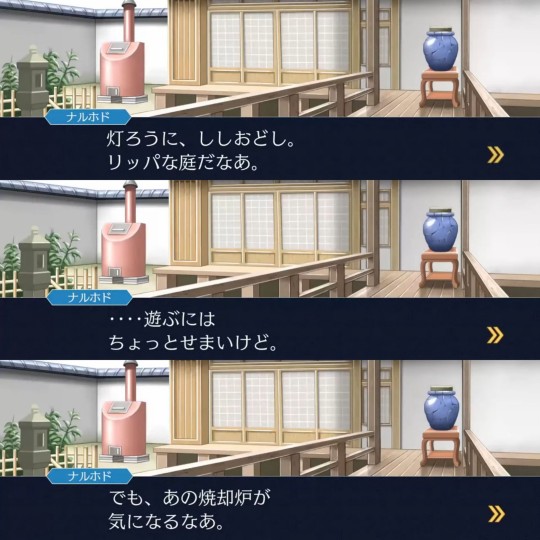
灯ろうに、ししおどし。リッパな庭だなあ。
tōrō ni, shishi odoshi. Rippana niwada nā.
Tōrō lanterns and Shishiodoshi. What a nice garden.
・・・・遊ぶには ちょっとせまいけど。
asobu ni wa chotto semaikedo.
... It's a little small to play in though.
でも、あの焼却炉が気になるなあ。
demo, ano shōkyakuro ga ki ni naru nā.
But I'm curious about that incinerator.

鹿威し (ししおどし) [shishiodoshi] - water-filled bamboo tube which clacks against a stone when emptied, device for scaring birds from gardens
___________________________________________
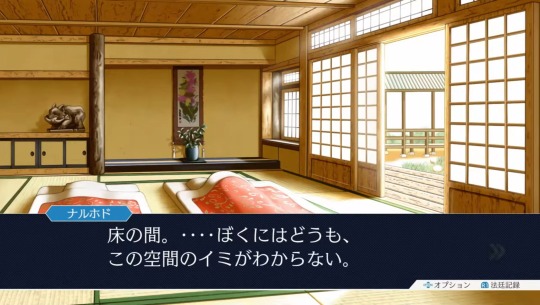
床の間。・・・・ぼくにはどうも、 この空間のイミがわからない。
tokonoma. Boku ni wa dōmo, kono kūkan no imi ga wakaranai.
Tokonoma. ...I don't really understand the meaning of this space.
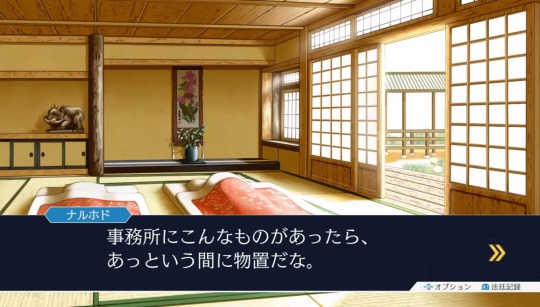
事務所にこんなものがあったら、 あっという間に物置だな。
jimusho ni kon'na mono ga attara, attoiumani monookida na.
If I had something like this in my office, it would just turn into a storage room.
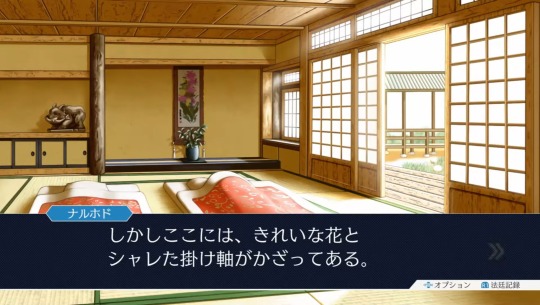
しかしここには、きれいな花とシャレた掛け軸がかざってある。
shikashi koko ni wa, kireinahana to shareta kakejiku ga kazatte aru.
But there are beautiful flowers and stylish hanging scrolls here.
Tokonoma is an alcove or niche in the wall of a traditional Japanese home, one of the 4 main components of the main room of a Japanese aristocratic house.
Tokonoma should contain only art objects, such as kakemono - a scroll with a painting or a calligraphically written saying, motto or poem. Also, a small flower arrangement (ikebana) is a common attribute.
Interesting fact: according to Japanese etiquette, the most important guest sits with his back to the tokonoma.
Now pay attention to where and how the futon is located, on which the guest in the beret slept (if she had sat down on the futon, she would have ended up with her back to the tokonoma). Here you have a "simple student studying the occult".
Well, the fact that Naruhodo sees no point in having such a space in the house and is ready to use it as a warehouse, completely ignoring its original purpose, tells us that for him it is considered a relic of the past and has no sacred meaning (even as an art object). He is a modern resident of modern Japan, where there is no place for such traditions.
___________________________________________
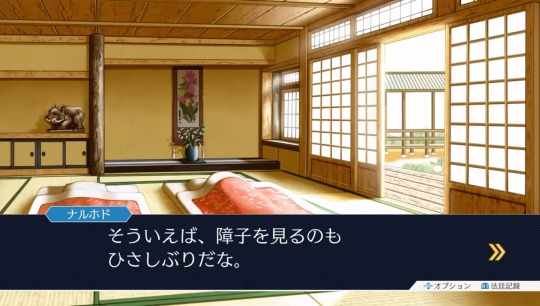
そういえば、障子を見るのもひさしぶりだな。
sō ieba, shōji o miru no mo hisashi-burida na.
Now that I think about it, it's been a while since I last saw a shoji screen.
___________________________________________
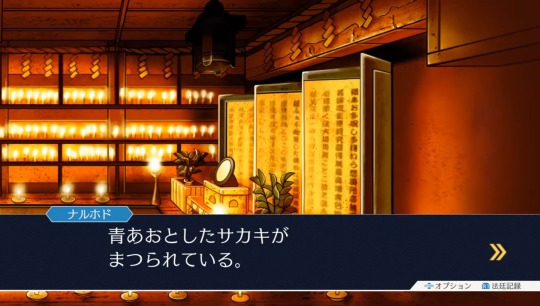
青あ��としたサカキが まつられている。
aoao to shita sakaki ga matsura rete iru.
A blue Sakaki tree is enshrined here.
Cleyera japonica (sakaki) is a flowering evergreen tree. It is considered sacred to Japanese Shintō faith, and is one of the classical offerings at Shintō shrines. In Shinto ritual offerings to the "gods; spirits" (神, kami), branches of sakaki are decorated with paper streamers (shide) to make tamagushi.

It turns out to be quite interesting - if a person is not familiar with these interior items, then not only will he not tell anything about them, but he will not even know what they are called. Naruhodo, whose childhood fell at the end of the 20th - beginning of the 21st century, could have learned about this only in a couple of cases:
1. He had been in a traditional Japanese house before, saw these items and was told about them by older relatives;
2. He independently studied old interior items (which is not surprising, because he studied art at the university).
This is also confirmed by his comment about shoji: "it's been a while since I last saw a shoji screen".
That is, he saw all this with his own eyes, but quite a long time ago.
Naruhodo is quite well educated in the culture of his own country, although some things have already lost their sacred meaning for him and are not used by him (and, possibly, his family) in everyday life.
Let's continue in the next part.
#ace attorney#gyakuten saiban#phoenix wright#naruhodo ryuichi#i said what i said#in the gks universe together with croq#long time no see
95 notes
·
View notes
Text
Quirk counseling: canon, the cultural references and what we can guess from this all (now with the bit about Chap. 431)
So, a recent ask I received pushed me to dig more into Quirk counseling, in hope I could offer better information about it.
Also thanks to @poppy5991 who helped me to expand the overmentioned ask adding to it things I forgot to mention. Hopefully this time I've covered things better. If not, I apologize.
2024-12-05 edit: As Horikoshi added a bit about Quirk counseling in Chap. 431 I've expanded this post to include that too. You can find it at the bottom of the post under the title "CHAPTER 431 AND WHAT IT TELLS TO US".
LOOKING AT CANON AND WHAT IT TELLS US
There’s not much about Quirk counseling as it gets mentioned, as far as I know, exactly 6 times in the whole 42 volumes (and the anime).
The first time Quirk counseling comes up, is after Shigaraki’s attack in chap. 22... and not much is said.
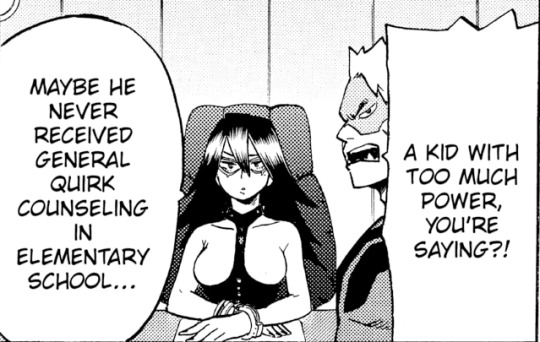
MIDNIGHT ‘Shōgaku-ji no “issei ‘kosei’ COUNSELING” uke tenai no kajira...’ ミッドナイト「小学時の『一斉〝個性〟カウンセリング 』受けてないのかじ��...」 Midnight “Didn’t he receive “universal/mass/simultaneous ‘Quirk’ counseling” in elementary school?” [Chap. 22- Ep. 14]
From what Midnight says we can infer that ‘Issei “kosei” COUNSELING’ [一斉〝個性〟カウンセリング “universal/simultaneous/mass ‘Quirk’ counseling”] is given in elementary school as kind of a group activity or class lesson as ‘issei’ (一斉) generally is used to say “simultaneous”, “all at once”, which should imply all the kids at elementary school (or more likely, all the kids in a class) get it at the same time.
For contest, Midnight brings this up because they think Tomura has too much power and was never taught to ‘control’ it (as in not to use it to do what he wants). So we can guess Quirk counseling would, in their mind, have given Tomura a better grasp of what was allowed to do with his Quirk and what wasn’t (with becoming a Villain being definitely on the ‘Don’t do it’ list).
The discussion about Quirk counseling won’t progress any further.
The next time Quirk counseling is mentioned is in chap. 165.
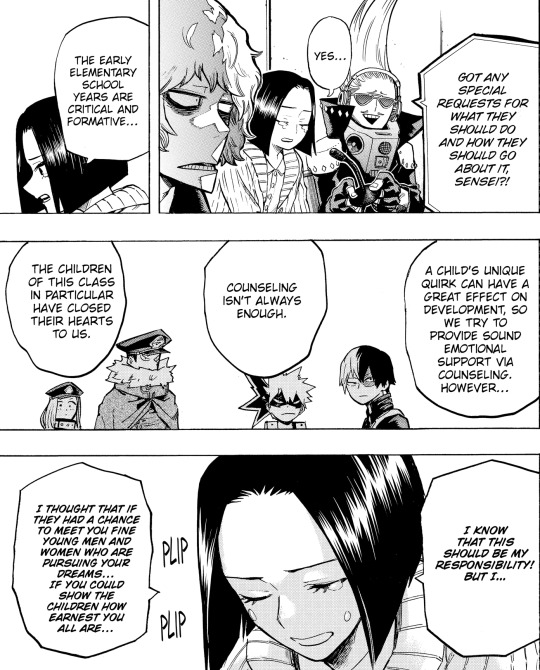
Ikoma Komari ‘Hai… shōgakkō teigakunen wa jinkaku keisei ni oite taisetsuna jiki desu...〝Kosei〟 no chigai ga ōkiku eikyō suru tame COUNSELING o okonai. Sukoyakana seishin o hagukumeru yō SUPPORT suru no desu ga... COUNSELING mo bannōde wa arimasen. Kono CLASS no ko-tachi wa watashi-tachi ni kokoro o tozashite shimaimashita. Watashi no sekinindearu koto wa shōchi shite imasu...! Desuga...! Yume ni mukatte hagende rassharu minasama to fureau koto de massuguna kimochi o omoidasa sete age rarereba…’ 生駒小麿里「はい…小学校低学年は人格形成に於いて大切な時期です...〝個性〟の違いが大きく影響する為カウンセリングを行い。健やかな精神を育めるようサポートするのですが...カウンセリングも万能ではありません。このクラスの子たちは私達に心を閉ざしてしまいました。私の責任であることは承知しています...!ですが...!夢に向かって励んでらっしゃる皆さまと触れ合うことでまっすぐな気持ちを思い出させてあげられれば…」 Ikoma Komari “Yes... the early years of elementary school are an important time for personality development... differences in “Quirk” have a big impact, so we provide counseling. We support them in developing a healthy mind... but counseling is not a panacea. The children in this class have closed their hearts off to us. I know that it is my fault...! But...! I hope that by interacting with all of you who are working hard towards your dreams, we can help them remember their honest feelings...” [Chap. 165-Ep. 79]
Here we don’t talk specifically of Quirk counseling, just of counseling and of how ‘differences in Quirk’ have a big impact on personality development, also adding that counseling is not a fix-it-all. Ironically though, all the kids in the class seems to be the same according to their teachers, ‘mondaiji’ (問題児 “problem children”) who’re always ‘hanko-teki’ (反抗的 “rebellious”/“defiant”) no matter what she does despite them all having very different Quirks, children who have ‘closed their heart’ to them (aka they aren’t listening to them anymore) and feel they’re better than anyone else and it’s clear with this class counseling didn’t work at all.
We jump at chap. 226.
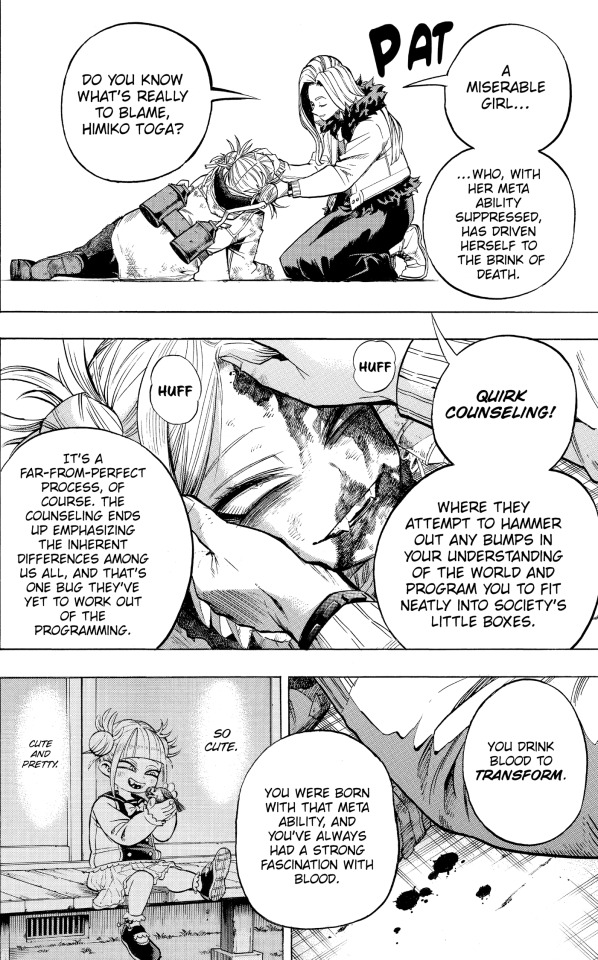
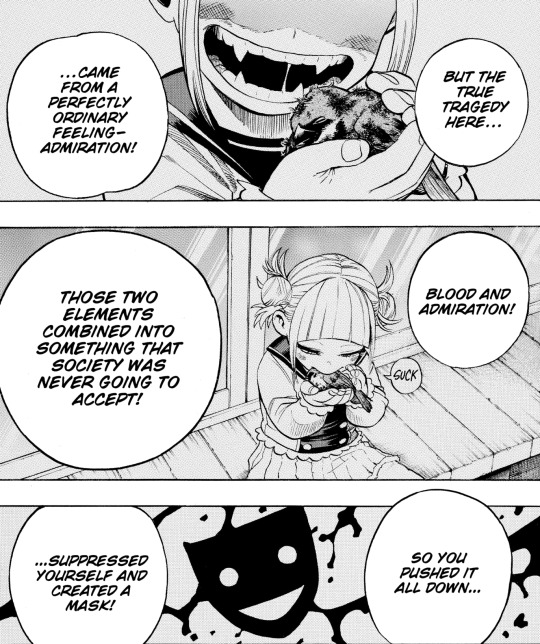
CURIOUS ‘Inō no yokuatsu ni yotte jibun o koroshita fukōna shōjo, sore ga anata nandesho? Toga Himiko. ‘“Kosei” COUNSELING’, jita rikai no yugami o kyōseishi shakaisei no suri awase o hodokosu jōsō kyōiku (read: PROGRAM). Mochiron, kanpekina PROGRAM de wa naishi, kojinsa o yori tsuyoku kanjite shimau to iu mondai o kakaete imasu. Chi o nomi henshin suru, umaretsuki motsu sono inō ni yotte anata wa “chi” ni tsuyoi kyōmi o hikareru yō ni natta. Shikashi shin no fukō wa “akogare” to iu dareshimo ga daku futsū no kanjō. Chi to akogare kamiatte shimatta nitsu no yōso wa tōtei shakai ni ukeire rareru MONO de wa nakatta. Dakara, anata wa FUTA o shita. Jishin o yokuatsu shi kamen o tsukutta.’ キュリオス「異能の抑圧によって自分を殺した不幸な少女、それがあなたなんでしょ?渡我被身子(トガヒミコ)。『〝個性〟カウンセリング』、自他理解の歪みを矯正し社会���の擦り合わせを施す情操教育(プログラム)。もちろん、完璧なプログラムでは無いし、個人差をより強く感じてしまうという問題を抱えています。血を飲み変身する、生まれつき持つその異能によってあなたは〝血〟に強い興味を引かれるようになった。しかし真の不幸は〝憧れ〟という誰しもが抱く普通の感情。血と憧れ噛み合ってしまった2つの要素は到底社会に受け入れられるモノではなかった。だから、あなたはフタをした。自信を抑圧し仮面を作った。」 Curious “You’re an unfortunate girl who killed herself by suppressing her supernatural powers, aren’t you? Toga Himiko. ‘“Quirk” counseling’, it’s an emotional education (read: program) to correct distortions in self-understanding and other things, and to adjust for socialization. Of course, it’s not a perfect program, and it has the problem of making individual differences even more apparent. Your innate ability to transform by drinking blood has made you very interested in “blood”. However, your true misfortune is “admiration”, a normal emotion that anyone can have. The two elements that go together, blood and admiration, were never going to be accepted by society. So you put a lid on it. You suppressed your confidence and made a mask.” [Chap. 226]
Episode 109 should be the one in charge to transpose this scene in animation but episode 109 cut the references to Quirk counseling.
CURIOUS ‘Inō no yokuatsu ni yotte jibun o koroshita fukōna shōjo. Sore ga anata nandesho? Toga Himiko. Umaretsuki motsu sono inō ni yotte anata wa chi ni tsuyoi kyōmi o hikareru yō ni natta. Shikashi, shin no fukō wa akogare to iu dareshimo ga daku futsū no kanjō to chi e no kyōmi, kono futatsu ga kamiatte shimatta koto. Sore wa tōtei shakai ni ukeire rareru MONO de wa nakatta. Dakara, anata wa FUTA o shita. Jishin o yokuatsu shi kamen o tsukutta.’キュリオス「異能の抑圧によって自分を殺した不幸な少女。それがあなたなんでしょ?渡我被身子。生まれつき持つその異能によってあなたは血に強い興味を引かれるようになった。しかし、真の不幸は憧れという誰しもが抱く普通の感情と血への興味、この二つが噛み合ってしまったこと。それは到底社会に受け入れられるモノではなかった。だから、あなたはフタをした。自信を抑圧し仮面を作った。」 Curious “You're the unfortunate girl who killed yourself by suppressing your supernatural powers. That's you, isn't it? Toga Himiko. The supernatural power you were born with has made you very interested in blood. However, your true misfortune was that your fascination with blood and your normal emotion of longing were intertwined. This is something that could never be accepted by society. So you put a lid on it. You suppressed your confidence and made a mask.” [Ep 109]
It’s a bad decision as Quirk counseling was meant to become important later but that’s what they decided to do.
Anyway in the manga there’s something we can work with, if before we were told Quirk counseling helps in developing personality, here it’s clarified the help is aimed at helping people to act ‘normal’, so that they can have a correct perception of themselves as well as socialize and interact correctly, the problem is it suppresses whatever is judged ‘not normal’ in a person and Quirks often generate wild differences between what’s normal for a person and what’s normal for another.
The result of this is that Quirk counseling ends up remarking in an even stronger way the differences between people, by forcing them to suppress feelings that are dictated by their Quirk.
We then jump to chap. 370.
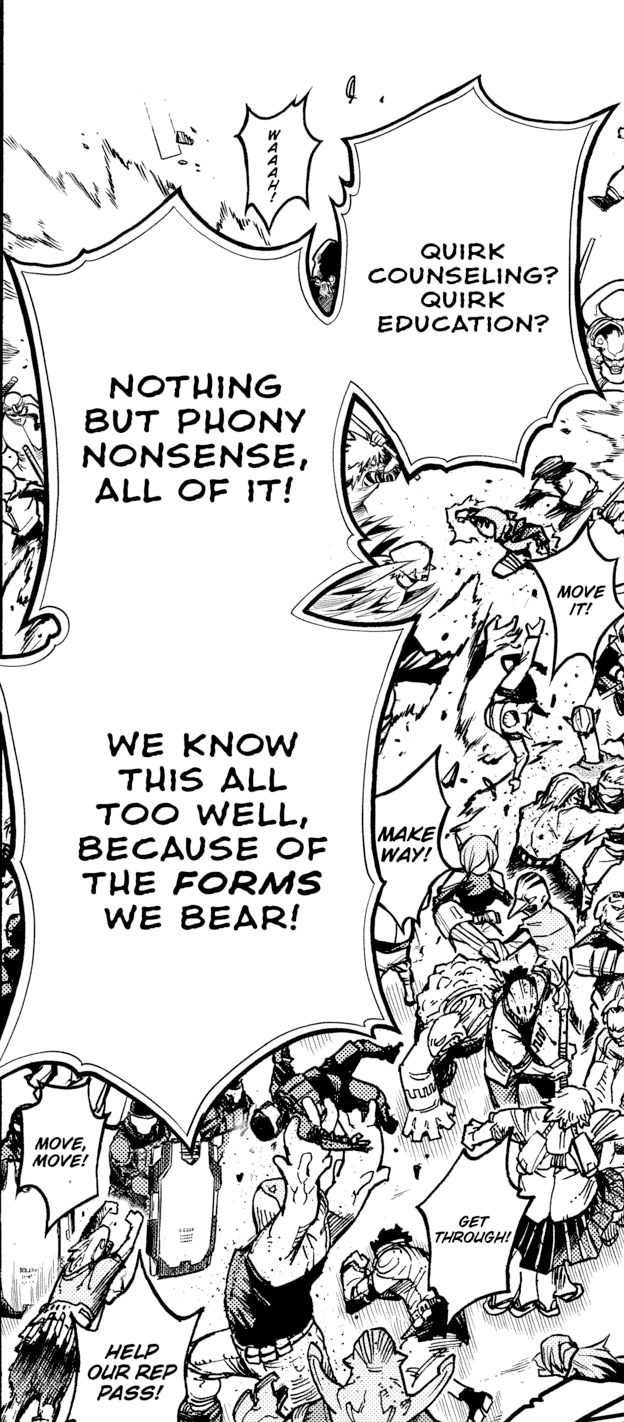
? ‘“Kosei” COUNSELING!” Kosei” kyōiku! Kore ga nise (read: mayakashi) de aru koto o! Wareware wa “katachi” o motte shitte iru!.’ ?「〝個性〟カウンセリング!〝個性〟教育!これが贋(まやかし)である事を!我々は〝形〟を持って知っている!」 ? ““Quirk” counseling! “Quirk” education! This is phony/bogus/sham (read: fake/deception)! We know it due to having this “shape/form”!” [Chap. 370-Ep. 152]
At this point we’ve a nameless heteromorph guy claiming Quirk counseling (along with Quirk education) is basically a sham, it’s not it didn’t work with that class of kids by coincidence, it’s just something that doesn’t really work with Heteromorphs.
While there’s not really an explanation we can guess that, if the point of Quirk counseling is making people ‘normal’, Heteromorphs, who in Japanese are called ‘Igyō’ (異形 “abnormal”), have a hard time with it, since they’re not normal by definition and can’t really change/suppress their ‘not normal’/‘heteromorphic’ traits.
We aren’t told what Heteromorphs are told during Quirk counseling, and the thing is made more complex by how somehow in big cities there’s no discrimination, while in rural villages people still go for ‘chiharai’ (血祓い “blood cleansing”), beating and scarring Heteromorphs who dare to come into contact with not-Heteromorphs, no matter if it’s to save them.
We then jump to chap. 392.
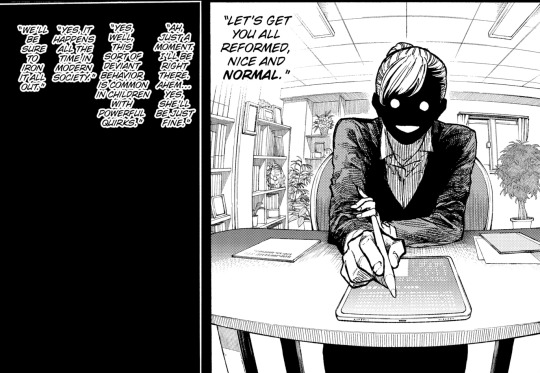
? ‘HAI kyōsei shite ikimashou “futsū” ni. A HAI mō chotto matte kudasai. Sugu sotchi ikimasu. Etto… ē daijōbudesu. Sō desu ne… tsuyoi “kosei” o motsu ko niarigachi na tōsaku desu yo. Kono shakai de wa yoku aru koto desu. Tadashite keshite ikimashou.’ ?「ハイ矯正していきましょう〝普通〟に。あハイもうちょっと待ってください。すぐそっち行きます。えっと…ええ大丈夫です。そうですね…強い〝個性〟を持つ子にありがちな倒錯ですよ。この社会ではよくあることです。正して消していきましょう。」 ? “Yes, let’s correct it and make it “normal”. Ah, yes, please wait a moment. I’ll be there right away. Um... yes, it’s okay. Well... it’s a common perversion among children with strong “Quirks”. It’s common in this society. Let’s correct it and eliminate it.” [Chap. 392]
Here we see a person talking with Himiko’s parents. We aren’t told this person is a Quirk counselor but, I guess, that’s the idea. It’s hard to say if she’s Himiko’s teacher or an external figure, however it makes clear Quirk counseling is more or less what Curious said. That person thought Himiko being fascinated by blood was wrong, she actually calls it a ‘tōsaku’ (倒錯 “perversion”), albeit one she labels as common, and tried to force Himiko to suppress her feelings so she could perceive herself and socialize with the others in a ‘correct’ way.
An interesting difference between the manga and the anime is that in the anime that person’s talk is more streamlined... and we see her also talking with Himiko's parents.


? ‘Hai kyōsei shite ikimashou futsū ni. Sō desu ne… tsuyoi kosei o motsu ko niari-gachina tōsakudesu yo. Kono shakaide wa yoku aru kotodesu. Sei shite keshite ikimashou.’ ?「ハイ矯正していきましょう普通に。そうですね…強い個性を持つ子にありがちな倒錯ですよ。この社会ではよくあることです。正して消していきましょう。」 ? “Yes, let's correct it and make it normal. It's a perversion that is common among children with strong Quirks. It's a common occurrence in this society. Let's correct it and eliminate it.” [Ep. 158]
This might imply that in the manga that person is actually busy with more things at once, she doesn’t have a lot of time to dedicate to Himiko’s parents and therefore she doesn’t have a lot of time to dedicate to Himiko.
Back to the conversation though, regardless of the source, the person talking makes clear that what Himiko does isn’t just something that’s “rude”/“inappropriate” to do in society but that it’s a “perversion”, a common one, yes, but a “perversion” and she says so to her parents who were already worried she wasn’t human.

Chichioya ‘Mō nekko ga!’ 父親「もう根っこが!」 Father “Her core/roots is/are already– (gone/rotten)!”
Hahaoya ‘Ningen ja nai ko un jatta!’ 母親「人間じゃない子産んじゃった!」 Mother “I gave birth to a child that isn’t human!” [Chap. 392-Ep. 158]
And later
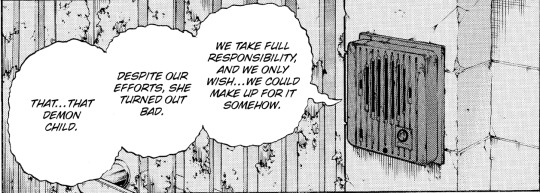
Hahaoya ‘Watashi-tachi ga waruin desu. Mō… tsugunai kirenai desu… ganbatta kedo damedattan desu… ano ko ha… akuma no konan desu.’ 母親「私たちが悪いんです。もう…償い切れないです…頑張ったけど駄目だったんです…あの子は…悪魔の子なんです。」 Mother “It's our fault. We can never make up for it. We tried our best but it was no use. That child is a demon's child.” [Chap. 226]
So Quirk counseling didn’t really reassure her parents nor solved Himiko’s problems. They weren’t going to accept that Himiko could have different feelings from the norm and help her to cope with them correctly, they just wanted to eradicate them from her. As she couldn’t, she was forced to suppress them… and since she couldn’t keep them bottled up forever they eventually exploded and lead her to hurt Saito.
The last time Quirk counseling comes up is at the end of the manga.

? ‘Tsudzuite wa TEAM-UP NEWS. INGENIUM, FROPPY, CREATI soshite URAVITY ga zenkoku no shōgakkō o megutte imasu. Teki (read: VILLAIN) hasseiritsu no genshō ni tomonai katsudō no haba wo hirogeru “HERO”-tachi sono naka demo-- URAVITY no uchidashita “kosei” COUNSELING kakuchō keikaku wa ima mottomo hitsuyō fukaketsuna katsudō to iwa rete imasu.’ ?「続いてはチームアップニュース。インゲニウムフロッピー・クリエティそしてウラビティが全国の小学校を巡っています。敵(ヴィラン)発生率の減少に伴い活動の幅を広げる〝ヒーロー〟たちその中でもーーウラビティの打ち出した〝個性〟カウンセリング拡張計画は今最も必要不可欠な活動と言われています。」 ? “Next up is team-up news. Ingenium, Froppy, Creativity and Uravity are touring elementary schools across the country. As enemy (read: Villain) occurrence rates decrease, the “heroes” are expanding the scope of their activities. Among them, Uravity’s “Quirk” counseling expansion plan is said to be the most essential activity right now.” [Chap. 430]
In this bit it seems that expanding Quirk counseling became a key factor in lowering the occurrence rate of Villains… which, of course, doesn’t seem to be possible since in almost all the other cases in which Quirk counseling was mentioned it turned out it either didn’t work (with the Masegaki elementary school kids) or made matters worse (Himiko and the heteromorphs). Is it a typing mistake as apparently the program already reached all the elementary schools so it didn’t need to be expanded and, anyway, didn’t work? Or does ‘expanding’ refers to actually put more resources and people in Quirk counseling so they can actually devote more time to the kids and help them better? Hard to say.
LOOKING AT THE CULTURAL CONTEST AND WHAT IT TELLS US
Counseling in Japan
While, of course, there’s no Quirk counseling in Japan, by 2006 Japan had school counselors (スクールカウンセラー) available in all the public middle schools. Prior to it though, this work was entrusted to the homeroom teacher (担任教師 ‘Tannin kyōshi’) and often also the school nurse (看護教諭 ‘Kango kyōyu’ ) who were meant to dispense discipline, encourage better conduct, increase motivation, provide career guidance, and offer advice. Those teachers though, were not trained in counseling, and it was often a duty they disliked, often choosing to use their classroom hours for something different than “moral education” depending on their personal educational agenda. Now instead, when problems arise, the teacher or the students or the students’ parents can ask help to the school counselor, which would also offer the plus of being a third party figure, so that they would be people not involved in evaluating students (and therefore have no conflict of interests with them) and would be professional in the field of psychology so as to offer better help to them.
Currently in Japan a school counselor visits a school about once a week to give children advice about various problems they face. School counseling is provided by clinical psychologists, psychiatrists and other professionals with expertise in mental health issues. In addition to advising children, the counselors can advise parents and teachers about how to handle their own day-to-day. A school counselor stands by in a counseling room where he or she listens to children’s problems one-on-one. Children can seek advice about whatever may worry them, such as relations with their friends, their family problems and uncertainties about their future and the counselor will advice them about how they should handle their problems while also talking with their homeroom teachers about what would be the best solution to each problem.
The problems with this system are often that the Clinical Psychologist isn’t also trained as a school counselor which leads with problems of interaction with the teachers, that there is confusion about the role of teachers and school counselors, and that there’s a HUGE stigma of shame at the idea of students or parents seeing a counselor. Much of the counseling that is now conducted in the Japanese schools is remedial with the individual as the focus; an approach that is contrary to the Asian interdependent view of self, an approach that seems to further exacerbate the student’s reluctance to see the school counselor.
It’s possible that Horikoshi, for earlier Quirk counseling, went with mix of the above, with it given both by the class homeroom teacher and by a specialist, or it given by the homeroom teacher only. It's not really clear.
Honne, Tatemae and Giri
Honne (本音 “true sound”) refers to a person's true feelings and desires.
Tatemae (建前 “built in front”, “façade”) refers contrastingly to the behavior and opinions one displays in public.
Giri (義理 “duty”, “obligation”) refers to the social obligations each person have.
Okay, fine, why should we care about these three words? Because Japanese people go to great length to hide their honne (true feelings) and show their tatemae (facade) so as to fulfill their giri (social obligation). They must do everything they can to avoid the disapproval of others, to avoid direct confrontation or disagreement. They’re completely justified in telling white lies to hide their true nature and present their Tatemae, so completely justified they can lie even in trial, that they’re expected to do so (remember when, in chap. 306, a guy said Enji should have just lied in regard to what Touya declared?).
Part of the Quirk counseling plan is clearly based on this, on teaching children how to show a socially acceptable tatemae and hide their own honne. This is what Himiko was taught, that her own fascination for blood was an unacceptable honne and needed to be buried inside herself if she wanted to be ‘normal’. That it was her duty to present herself as ‘normal’ and therefore show solely an acceptable tatemae.
Tōsaku (倒錯 “perversion”) and double meanings
As said before ‘Tōsaku’ means “perversion” and it’s used to describe how Himiko is fascinated by blood… but this is a word also used to describe sexual deviances… and Horikoshi clearly had fun with using words with double meanings in Himiko’s case, for example the onomatopoeia for sucking blood (ちうちう ‘chiuchiu’), sounds also like the onomatopoeia for kissing, Himiko is referred as a ‘ijōsha’ (異常者) which can be translated as “deviant” but also as “pervert” and so on. In short Horikoshi subtly create parallels between Himiko’s love for blood and the fact that Himiko’s way of loving people is not what in Japan is labeled as normal (she also loves girls and not just boys and would like to hurt people she loves). So, while Himiko’s problem of being fascinated with blood might seem distant from the audience as people in real world don’t have a Quirk that makes them fascinated with blood, the parallelism with sexual inclinations bring Himiko back into someone with whom people can relate and, in a way, someone that stands in parallel with Magne.
Heteromorphs, how ‘not normal’ they are meant to be and blood impurity
In English the word ‘Igyō’ (異形) had been translated as “heteromorph” but a better translation is “abnormal” or, more literally “not normal shape”. In a Quirk counseling program that aims at making everyone ‘normal’, who already starts with a name that states they’re not with a normal shape is clearly cut out of the race.
When Shouji talks of what was done to him he mentions ‘chiharai’ (血祓い “blood cleansing”) [Chap. 371] and, in the previous chapter, he was told he had ‘imi chi’ (忌み血 “cursed blood”) [Chap. 370].
Japan is very invested in blood purity, in pre-Meiji era Shinto and Buddhist traditions considered blood (血 ‘chi’) a source of symbolic pollution or ‘kegare’ (穢れ “uncleanness”, “defilement”) with elaborate rituals of avoidance and purification, however, in the Edo period (1603–1868) blood gained the positive meaning of “lineage”/”life force”, overtaking the preceding key metaphors for heredity. This though ended up causing the solidification of a hereditary status system that placed certain groups of people as being permanently “polluted” because they had works tied with blood, like executioners, undertakers, slaughterhouse workers, butchers, and tanners called ‘eta’ (穢多 “great filth”) as well as beggars, street performers, prostitutes, convicted criminals, and the physically disabled among others called ‘hinin’ (非人 “not people”) which together form the group called ‘burakumin’ (部落民 “village people”) and were considered outcasts. Their own blood was considered permanently impure, they were subject to increasingly stricter sanctions that prohibited their contact and mixing with the rest of society by means of restricted residences, economic activities, special clothing, hairstyles, and tattoos and since now blood also was a term used to define lineage, its polluting property also came to be regarded as inheritable and permanent which is why people still don’t want to marry (aka ‘mix blood’) with people whose ancestors were ‘burakumin’.
This was also made worse from the 1900 eugenicist obsession with blood as a medium to modernize the Japanese race and nation.The pure Japanese blood, or “Yamato blood,” was now heralded as a refined superior substance to be protected or enhanced through social programs of reproduction and health also through eugenic marriage counseling services.
This ultimately expanded to include people who had mental illness or familiar with mental illness but also with people who are of not pure Japanese ancestry. We would probably talk about genetics. In Japan it’s referred as blood.
Blood type is, in Japanese mentality, also tied with personality and discrimination can be so high that some would just discriminate people with blood type B or AB as negative stereotyping credits the B types as selfish, and ABs as eccentric and unpredictable and therefore more prone to have a loose morality.
As a result even if Shouji being a Heteromorph is tied to his Quirk and his genes, the story talks about his ‘cursed blood’… and people could refer to it also in relation to how the Todoroki are related to a criminal, Touya/Dabi.
(Plus this also tells you why Himiko's fascination for blood could NEVER be accepted since things related to blood lead to impurity)
While all this doesn’t tell us much about Quirk counseling, it helps to get a better perspective on why blood is mentioned when Heteromorphs are discriminated and how strong discrimination can be based to blood ties, clearly making it something that can’t be overcome with just the discriminated person in question trying to ‘act normal’ by presenting an acceptable ‘tatemae’.
The series leaves unclear what exactly falls into the Heteromorph category because, if the problem is just the shape being not normal, things like having tapes in your arms or engines in your legs, or horns on your head also give you an abnormal shape. Overall we can assume that the more the shape is abnormal and hard to ‘disguise’ as normal, the more one ends up being considered as an Heteromorph (Shouji’s arms are a much more visible ‘abnormal’ trait than Iida’s legs or Sero’s arms).
Just so you know currently Japan lacks any law which prohibits racial, ethnic, or religious discrimination nor has any national human rights institutions. Although racism exists it’s a taboo topic. In the past in the name of national unity, the Japanese government identified and forcefully assimilated marginalized populations, which included indigenous Ryukyuans, Ainu, and other underrepresented groups, imposing assimilation programs in language, culture and religion. Japan considers these ethnic groups as a mere “subgroup” of the Japanese people and therefore synonymous to the Yamato people, and does not recognize them as a minority group with a distinct culture. This is why in the story Heteromorph discrimination isn’t punished but it could also be the basis for why the Quirk counseling doesn’t keep into consideration how Heteromorphs are different but tries to force them too to act ‘normal’.
Quirk
We’re all familiar with the term Quirk that in Japanese is ‘kosei’ (〝個性〟 always written between quotation marks) which, translated literally means “individuality” or “personality”. In a country that is group oriented, values uniformity and thinks standing out is bad, Quirks that instead grant an even more marked ‘individuality’ and that are unique to each person, should feel like a big deal… but also it you tie a superpower with your personality you might get some unpleasant combo that aren’t really meant to be. For example thinks at Tomura and at how his Quirk destroy/decay things. If you think that his Quirk is his ‘personality’ or tied to it, you get the idea Tomura is someone who can only destroy/decay, that has a destructive character, or that who has an animal Quirk has an animal character.
WHERE ALL THIS LEAVES US?
Japanese youths have been fighting so as to have their individuality recognized in various subtle ways but it’s still an ongoing battle. The same goes for the descendant of the Burakumin and for people in the LGBTQ+ community. Sadly most of those topics are kind of considered taboo to discuss in Japanese culture so it’s possible that Horikoshi’s attempt at saying that Quirk counseling would be improved is a subtle message that’s meant to say that in the BNHA world steps would be taken to improve the acceptance of those people and the recognition of each person’s individuality, implying more a change into mentality/education than a change into some institutionalized thing called ‘Quirk counseling’, hence he didn’t need to develop much how it would work.
Of course mine is purely speculation.
Ultimately, if we solely look at the story, how Quirk counseling work/is administered is hardly well explained in the story, and how is reformed is explained even less (saying just it underwent an expansion) as well as why Uraraka, who had no idea of Himiko’s problems with Quirk counseling, decided to focus on it. But it’s likely the cultural context that’s meant to make it work for Japanese readers using solely what little is explained as reference and, for them, improving it, is likely a big step.
For whose of us who are instead cut out from the whole cultural context, there’s just too little to work with and it feels forgettable and confusing.
Okay, my analysis originally was meant to end here but then chapter 431 was released and it talked about Quirk counseling and so I added this extra bit.
CHAPTER 431 AND WHAT IT TELLS TO US
In the volume version only chapter 431 we have a last mention of Quirk counseling, which ‘shows us’ a bit how it’s done now.





Uraraka Ochako ‘Masaka senpai-tachi no tsugō ga tsuku to wa‼ Kitto minna yorokobimasu!’ 麗日お茶子「まさか先輩たちの都合がつくとは‼きっと皆喜びます!」 Uraraka Ochako “I never thought my seniors would be able to make it! I'm sure everyone will be happy!”
Tōgata Mirio ‘Ore nankade ī no kana‼’ 通形ミリオ「俺なんかでいいのかな‼」 Tōgata Mirio “I wonder if I am the right person for this?”
Hadō Nejire ‘Nande sonna koto iu no? Fushigi!’ 波動ねじれ「なんでそんな事言うの?ふしぎ!」 Hadō Nejire “Why would you say that? Strange!”
Amajiki Tamaki ‘URAVITY no “kosei” COUNSELING ni kyōryoku dekiru nante kōei da yo.’ 天喰環「ウラビティの"個性"カウンセリングに協力できるなんて光栄だよ。」 Amajiki Tamaki “It's an honor to help Uravity’s ‘quirk’ counseling.”
Uraraka Ochako ‘Kono gakku no jidō no shiryō-me o tōshite moratta to omoundesu kedo nani yori daiji na no wa COMUNICATION desu. Ikken nan no mondai mo nai ko demo nayami o shimaikonderu koto ga ōi desu. Daishō towazu toku ni katei kankyō nanka shotaimen no otona ni hanaseru hito wa ōkunai desu. Demo jikan o kakereba kanarazu SAIN o dashiteru koto ni kidzukeru node shiryō ni tayori sugizu! Meyasu wa ikkagetsu teido desu ga naiyō shidai de zenzen hendō shimasu. Kazu wa ishiki shinaide otomodachi ni naru tsumori de!’ 麗日お茶子「この学区の��童の資料目を通してもらったと思うんですけど何より大事なのはコミュニケーションです。一見何の問題もない子でも悩みをしまい込んでる事が多いです。大小問わず特に家庭環境なんか初対面の大人に話せる人は多くないです。でも時間をかければ必ずサインを出してる事に気付けるので資料に頼りすぎず!目安は一か月程度ですが内容次第で全然変動します。数は意識しないでお友だちになるつもりで!」 Uraraka Ochako “I think you've looked through the materials about the children in this school district, but the most important thing is communication. Even children who appear to have no problems often keep their worries to themselves. Not many people, can talk to adults they meet for the first time, about problems big or small, especially about their home environment. But if you take your time, you'll definitely notice the signs, so don't rely too much on the materials! The guideline is about a month, but it can vary greatly depending on the content. Don't worry about numbers, just try to make friends!”
Amajiki Tamaki ‘Taihen da ne.’ 天喰環「大変だね。」 Amajiki Tamaki “That's tough.”
Uraraka Ochako ‘Zenzen! Jin'in no SUPPORT wa jūbun desu shi minasan sugoku teinei na oshigoto o sarerun desu yo. HAWKS ga monkashō ni kake attari kakusho ni kyōsan o tsumettari shite kurete “kosei” kyōiku no kankyō wa daibu kaizen sarete kiterundesu.’ 麗日お茶子「全然!人員のサポートは十分ですし皆さんすごく丁寧なお仕事をされるんですよ。ホークスが文科省に掛け合ったり各所に協賛を積めったりしてくれて"個性"教育の環境はだいぶ改善されてきてるんです。」 Uraraka Ochako “Not at all! There is enough staff of support and everyone does a very careful job. Hawks has been negotiating with the Ministry of Education and providing support from various places, and the environment for ‘Quirk’ education has improved considerably.”
Amajiki Tamaki ‘Jā ima wa jibun no tame no jikan mo torerunda?’ 天喰環「じゃあ今は自分の為の時間も取れるんだ?」 Amajiki Tamaki “So now you have time for yourself?”
Uraraka Ochako ‘Gimu toka… sekinin toka nai wake ja nai desu kedo ato kara tsuitekita mono desu. Yorokobu kao o miru no ga suki nandesu. Watashi ga yaritaikoto shitemasu. Tsuyu-chan mo hobo zutto TEAM-UP shite kureteru shi tomodachi to mo aeteru shi zenbu jibun no tame no jikan desu yo!’ 麗日お茶子「義務とか…責任とかないわけじゃないですけど後からついてきたものです。喜ぶ顔を見るのが好きなんです。私がやりたい事してます。梅雨ちゃんもほぼずっとチームアップしてくれてるし友だちとも会えてるし全部 自分の為の時間ですよ!」 Uraraka Ochako “It's not that I don't have obligations or responsibilities, but they came after. I like to see people's happy faces. I'm doing what I want to do. Tsuyu-chan has been teaming up with me almost all the time, I've been able to meet up with my friends, and so it's all time just for myself!” [Chap. 431] Now, I’m not 100% sure if the idea is to always involve Pro Heroes or ‘the supporting staff’ can be composed also of ‘not Pro Hero’ people, but we get a general idea of what the people who decide to take part to the project should do. They read the documents about the kids, they’re encouraged to make friends with them, possibly/likely involving them in a game in which they use their Quirk which will allow them to receive what we can call ‘Quirk positivity’. All this in order to help children to open up and talk about their (Quirk related) problems. This last for around a month then, if no problems are detected (or if they are but they’re solved by that time), the people involved move to another school.
Now… maybe it’s just me but this is basically what was done during the ‘remedial course’ arc with the kids from the Masegaki school, only, they’re given documentation about the kids and, instead than lasting one time, it last one month and it involves Pro Heroes, not Heroes in training who might not be interested in interacting with children but are forced to do it if they want their license.
In this sense the whole ‘expansion’ thing of chapter 430 finds it’s explanation. Heroes are expanding their activities (aka also taking part to other activities like Uraraka’s Quirk counseling program) and the Quirk counseling program is being expanded as well as now its scope isn’t anymore to just help children to fit into the standards of normalcy society created but to offer them Quirk positivity and to create a connection so that THE CHILDREN will be willing to talk about their problems with Quirk and with their family.
Storywise it’s a pity the original characters involved in the ‘remedial course’ arc aren’t mentioned as being involved in all this, especially Shouto (who not only had an extremely troublesome Quirk related family situation plus a brother with problems with his Quirk who almost killed himself, was targeted by a Villain, became a Villain and eventually died). Yes, we can picture they are, but, as far as canon is concerned, he isn’t mentioned AT ALL, not even as one of the sources of inspiration for how Uraraka’s project is structured (canon also didn’t show Bakugou or Shouto talking about their remedial course with classmates) but okay, this isn’t really related to Quirk counseling.
Now with all those additional info I can talk a bit of something else aka:
REALITY CHECK
Uraraka’s project is nice and well meaning but it’s also very fairytalesque, in the same way as Hawks claiming that Heroes having free time would be a good thing. It’s all well and good and, since BNHA is a tale, I’m sure it’ll work like a charm and if you want to stop reading here and enjoy such a happy world I’ll understand you.
However if you want to know if this will work in the real world…
In the real world, if the request for Heroes were to decrease because there are less Villains (and having less Villains would surely be a good thing), it wouldn’t mean people would hire the same amount of Heroes and keep on paying them just the same, we would simply have more unemployed Heroes or society would self regulate itself by simply giving out less and less Hero licenses. In short, society would NEVER allow Heroes to have more free time, it would just hire less Heroes or, in the very best case, pay them less. Sure, the problem can be solved with Heroes reinventing their job, for example volunteering to take part to Uraraka’s Quirk counseling project so as not to lose their job and their source of income.
With this though, comes a worsening of the main problem I see in Uraraka’s Quirk counseling project.
There is no mention whatsoever that the people involved are TRAINED to spot (Quirk related) psychological problems. Kids with psychological problems (due to their Quirk and family environment reacting badly to their Quirk) aren’t necessarily always showing a villainous behavior or a transgressive behavior (which is what Heroes are trained to spot), they can be acting as ordinary well behaving kids, or be meek or be people pleasers or vivacious but apparently harmless kids.
While it’s true that elementary school kids are generally more direct in their actions and reactions, some of them could have already mastered the fine art of hiding/masking things for fear of repercussions or due to them being educated to lie about certain things or even being made believe in such lies so they don’t even know they’re lying anymore.
Quirks, it’s worth to mention, don’t necessarily manifest at 4, they can manifest as early as their childbirth (see the luminescent baby or AFO himself), and sometimes a child can be born in a house where the ‘Quirk problems’ are caused by the parents’ expectations (think at how Enji wanted his children to have a certain Quirk and inherit his place). In short they might have been forced BY BIRTH to interact with ‘unpleasant’ situations and might have also been forced to learn to cover them up.
Fuyumi for example, lived in a toxic environment but, likely, masked that up well. Himiko took longer at learning to mask it up well, but her Quirk manifested when she was areound 3 or 4 and gave her a really strong instinct, for which she was left with zero family support (actually her parents’ reaction is completely out of proportion, kids at that age do plenty of stupid and gross things and then can grow up perfectly normal provided they’ve normal parents to guide them, there was totally no need to beat Himiko up and panic like that) and yet she learnt to mask it perfectly by the time she was in middle school, possibly even sooner as the journalists couldn’t find early signs and they likely searched for them like starved piranha.
In truth even professionals might miss the signs or might approach children in the wrong manner, causing more troubles than good because it’s a HARD job… so the idea that if completely untrained adult people who just read some data about the children (which might have been written by who already missed the signs or is misinformed about the real situation of the children) were to make friends with them, they would surely get them to open up or would surely notice signs that something is wrong and act in the appropriate manner to fix it is… well… very naïve.
It’s well meaning and it can surely help in some cases but, unless Japan had a REALLY ABNORMAL PROBLEM so that the TINIEST help would make a BIG difference, don’t expect the big change the press is talking about… especially if Heroes who have no more Villains to capture and zero interest in helping kids will be ‘forced’ to join the program so as not to become unemployed.
On the other side the lack of psychological preparation in people can be very well explained with how there’s a strong stigma in Japan regarding psychological problems.
The reason why real life normal counseling is often not used in Japan is because Japanese people don’t want to talk with a Clinical Psychologist (as said before now that’s the specialization a counselor needs to have) so Horikoshi’s ‘hey, but those people are normal, well meaning people, possibly even Heroes kids admire, not psychologists so talking to them doesn’t mean you’ve psychological problems so you can totally open up with them safely’ is meant to address this fear and, of course, it’s better to talk to an untrained person than not to talk at all so in this vein, this could be seen as an ‘improvement’.
I don’t know but I guess this is now really all we have about Quirk counseling.
Said all this, which is likely still an incomplete overview, I hope my ramblings will help people to understand Quirk counseling better. If not, I apologize.
#boku no hero academia#bnha meta#mha meta#bnha spoilers#Toga Himiko#bnha observations#bnha ramblings#Uraraka Ochako#Kayama Nemuri#Ikoma Komari#Kizuki Chitose#Iguchi Shuuichi#Shouji Mezou#Shigaraki Tomura
104 notes
·
View notes
Text

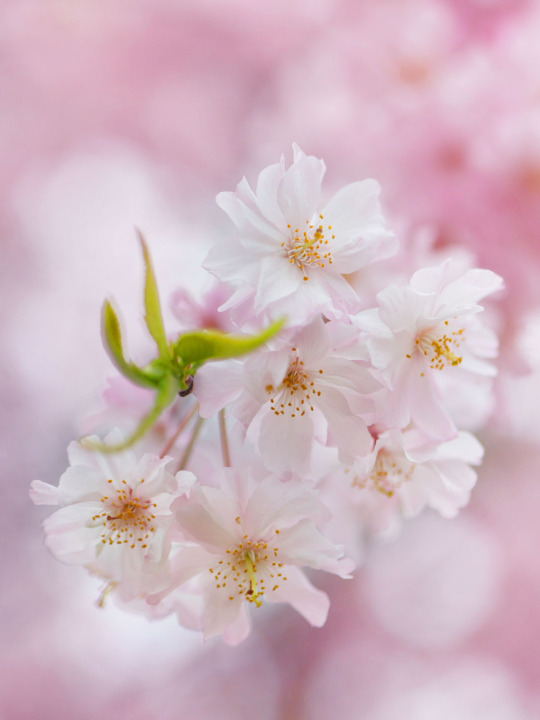








里の櫻 -Cherry blossoms in the village-
Hug had been feeling unwell since mid-March, and her poor condition lasted for about 4 weeks. However, this year, the full-fledged cherry blossoms bloomed quite late, so I was able to enjoy cherry blossom viewing with Hug, who has recovered.
Everything is not just a matter of course. I am deeply grateful for our beautiful and lovable everyday life :-))
3月中旬から4週間ほど、ハグが体調を崩した状態が続いていました。シニア齢になってからなにかしらの病気に罹ると治りが遅くなる傾向には��ったものの、ここまで長引くのは初めてのことで、イヌ飼い達の間では、しばしば愛犬の健康について「13歳の壁」なんていう話題が出るんですけど、ハグもいままさにその年齢であり色々と考えさせられてしまいます。
でも無事に回復してくれ、今年は桜の開花がかなり遅かったおかげで、元気を取り戻したハグと例年通りにお花見散歩ができたことがしみじみとうれしく感じられたのでした🌸😚🐶🌸
https://m.youtube.com/watch?v=DhMnhIY1pE0
300 notes
·
View notes
Text
Memo for Episode 20 (Ep.44) “Stronghold”
It contains major spoilers, so if you haven't seen the anime yet, don't read on.
猫猫(子翠(シスイ)の正体(しょうたい)は、楼蘭妃(ロウランひ)だった。とんだ役者(やくしゃ)…いや、まるで狸(たぬき)のようだ。四夫人(よんふじん)に特別(とくべつ)授業(じゅぎょう)をした時(とき)、派手(はで)な装(よそお)いで、無表情(むひょうじょう)なまま授業(じゅぎょう)を聞(き)いていた。皇太后様(こうたいごうさま)から隠(かく)れたり、大浴場(だいよくじょう)で里樹妃(リーシュひ)に近(ちか)づかなかったのも、自分(じぶん)が楼蘭妃(ロウランひ)だとバレないようにするためだろう。私(わたし)から隠(かく)れなかったのは、毛毛(マオマオ)を捕(つか)まえた時(とき)に楼蘭妃と気付(きづ)かなかったから…。うすうす感(かん)じてはいたが…。虫好(むしず)きで、ちょっと変(か)わっていて、噂話(うわさばなし)に花(はな)を咲(さ)かせる普通(ふつう)の子(こ)。見事(みごと)、子翠(シスイ)に化(ば)かされていたというわけか…)
Maomao (Shisui’no shotai’wa, Roran-hi datta. Tonda yakusha… iya, marude tanuki’no-yoda. Yon-fujin’ni Tokubetsu-jugyo’o shita-toki, hade-na yoso’oi’de, mu-hyojo-na-mama jugyo’o kiite-ita. Kotaigo-sama’kara kakure-tari, dai-yokujo’de Rīshu-hi’ni chikazuka-nakatta-no’mo, jibun’ga Roran-hi-dato bare-nai-yoni suru-tame-daro. Watashi’kara kakure-nakatta-nowa, Maomao’o tsukamaeta-toki’ni Roran-hi-to kizuka-nakatta-kara… Usu-usu kanjite’wa ita-ga… Mushi-zuki’de, chotto kawatte-ite, uwasa-banashi’ni hana’o sakaseru futsu’no ko. Migoto, Shisui’ni baka-sareate-ita-to-iu wake-ka…)
Maomao (Shisui’s true identity was Concubine Loulan. What an actress. Or maybe she’s more like a tanuki. When I gave that lecture to the four concubines, she had that flashy outfit and listened expressionlessly. She hid from the empress dowager and avoided Concubine Lishu at the baths so that she wouldn’t be recognized as Concubine Loulan. She didn’t hide from me, since I didn’t recognize her as Concubine Loulan when we caught Maomao the cat. I was starting to get the hint, but… An insect-loving, quirky, gossipy, but ordinary girl. Shisui played us all.)
とんだ(Tonda): unexpected, what a 〇〇!
とんでもない(Ton-demo-nai): unbelievable, outrageous
とんだ and とんでもない are similar but とんでもない contains a condemnation of something bad when you use it about others. (When you use とんでもない about yourself, it means humility. For example, someone say “You’re so beautiful!” and you answer “とんでもないです” that means “Not at all!”)
役者(やくしゃ/Yaku-sha): actor = 俳優(はいゆう/Haiyu) 役者 and 俳優 can be used regardless of gender.
女優(じょゆう/Joyu): actress (used for women only)
化かされる(ばかされる/Baka-sareru): be bewitched by, be tricked by
化かす(ばかす/Bakasu): bewitch, trick
化ける(ばける/Bakeru): appear in disguise, transform
In Japanese folk tales, raccoon dogs(tanuki) and foxes often trick humans by transforming into beautiful women or someone who looks like a real human. In KNH Lakan and Lahan are often described as foxes and Shishou as a tanuki because of their appearances and cunningness. In Japan, when describing people as animals, a cunning-looking person is compared to a fox, and a seemingly good person who deceives others is compared to a tanuki.
Finally, the true identity of Shisui was revealed to be Concubine Loulan. When I first read the original novel, I didn’t expect that at all and I was so surprised! Even knowing that, I was surprised that Loulan’s voice and the way she spoke sounded completely different from Shisui’s.
――――――――――――――――――――――――――――――
猫猫「楼蘭(ロウラン)は、その名前(なまえ)を気(き)に入(い)っているようですね。下女(げじょ)として偽名(ぎめい)を使(つか)うなら、もっと違(ちが)う名(な)を選(えら)べば良(よ)かったのに」
Maomao “Roran’wa, sono namae’o ki’ni-itte-iru-yo-desu-ne. Gejo-to-shite gimei’o tsukau-nara, motto chigau na’o erabeba yokatta-noni.”
Maomao “Loulan seems to like that name. She could have chosen any other name as her servant pseudonym.”
偽名(ぎめい/Gimei): pseudonym
翠苓「そういう子(こ)なんだ」
Suirei “So-iu ko nan-da.”
Suirei “It’s just how she is.”
The translation is perfect. I think this is an example of the translation that cannot be made by simply substituting words.
猫猫(同(おな)じ男(おとこ)の娘(むすめ)として生(う)まれたのに、母(はは)が違(ちが)うだけで、一方(いっぽう)は蝶(ちょう)よ花(はな)よと育(そだ)てられ、帝(みかど)の花(はな)として献上(けんじょう)される。そしてもう一方(いっぽう)は、官女(かんじょ)として後宮(こうきゅう)に送(おく)り込(こ)まれ、暗躍(あんやく)する。中祀(ちゅうし)での壬氏様(ジンシさま)暗殺未遂(あんさつみすい)事件(じけん)に、翠苓(スイレイ)は関(かか)わっていた。倉庫(そうこ)の爆発(ばくはつ)の混乱(こんらん)に乗(じょう)じて祭具(さいぐ)を盗(ぬす)み、発覚(はっかく)したら死人(しにん)を装(よそお)って逃走(とうそう)した。そして、先日(せんじつ)の飛発(フェイファ)を使(つか)った襲撃事件(しゅうげきじけん)も、子昌(シショウ)が黒幕(くろまく)だったのだろう。後宮管理者(こうきゅうかんりしゃ)の壬氏様(ジンシさま)は、後宮(こうきゅう)の有(あ)り方(かた)を変(か)えようとしていた。子昌(シショウ)のやり方(かた)に反(はん)するように。…しかし、それだけか?子翠(シスイ)…いや、楼蘭(ロウラン)が価値(かち)があると言(い)ったかんざし。ただの官(かん)ではない。いや、宦官(かんがん)ですらなかった)
Maomao (Onaji otoko’no musume-to-shite umareta-noni, haha’ga chigau-dakede, ippo’wa choyo-hanayo-to sodate-rare, mikado’no hana-to-shite kenjo-sareru. Soshite mo-ippo’wa, kanjo-to-shite kokyu’ni okuri-komare, an’yaku-suru. Chu-shi’deno Jinshi-sama ansatsu-misui-jiken’ni, Suirei’wa kakawatte-ita. Soko’no baku-hatsu’no konran’ni jojite saigu’o nusumi, hakkaku-shitara shi-nin’o yoso’otte toso-shita. Soshite, sen-jitsu’no feifa’o tsukatta shugeki-jiken’mo, Shisho’ga kuro-maku datta-no-daro. Kokyu-kanri-sha’no Jinshi-sama’wa, kokyu’no arikata’o kae-yoto-shite-ita. Shisho’no yari-kata’ni han-suru-yoni. …Shikashi, sore-dake-ka? Shisui… iya, Roran’ga kachi’ga aru-to itta kanzashi. Tada’no kan’dewa nai. Iya, kangan-de-sura nakatta.)
Maomao (Even though they were born from the same father, just because their mothers were different, one gets treated as a treasured princess to be given to the emperor. The other is sent in as a court lady to scheme in the shadows of the rear palace. Suirei was part of the attempt to assassinate Master Jinshi at that ceremony. She used the explosion at the warehouse as cover to steal some ceremonial tools, and when she was caught, she escaped, feigning death. And Shishou must have been the mastermind behind the feifa attack the other day. Master Jinshi, the manager of the rear palace, was trying to make changes. It wasn’t in line with what Shishou was doing. Is that all, though? Shisui… I mean, Loulan said this hair stick was valuable. He isn’t just some official. Rather, he wasn’t even a eunuch.)
蝶よ花よと育てられる(ちょうよはなよとそだてられる/Cho-yo hana-yo-to sodate-rareru): be brought up like a princess
献上する(けんじょうする/Kenjo-suru): to present something to someone noble/of the upper classes
暗殺未遂(あんさつみすい/Ansatsu-misui): assassination attempt = 暗殺(あんさつ/Ansatsu): assassination + 未遂(みすい/Misui): attempted
黒幕(くろまく/Kuro-maku): mastermind
――――――――――――――――――――――――――――――
翠苓「食事(しょくじ)は持(も)って来(く)る。くれぐれも、神美様(シェンメイさま)のご機嫌(きげん)を損(そこ)ねないように」
Suirei “Shokuji’wa motte-kuru. Kure-gure-mo, Shenmei-sama’no gokigen’o sokone-nai-yoni.”
Suirei “Food will be brought to you. Just make sure you don’t anger Lady Shenmei.”
くれぐれも(Kure-gure-mo): (When asking someone to do something important, to call someone’s attention) Make sure to~, Be careful to~, I repeatedly ask you to~
――――――――――――――――――――――――――――――
猫猫(里(さと)からここに連(つ)れて来(こ)られる時(とき)、一緒(いっしょ)に行(い)くと言(い)った響迂(キョウウ)に、翠苓(スイレイ)は渋(しぶ)い顔(かお)をした。本当(ほんとう)は里(さと)にとどめておきたかったのかもしれない。もし、子(し)の一族(いちぞく)が謀反(むほん)を起(お)こしたとなれば、一族郎党(いちぞくろうとう)、その罪(つみ)を負(お)わされるだろう。それは、女(おんな)、子供(こども)でも、赤子(あかご)でも。子供(こども)たちは知(し)っているのだろうか。大人(おとな)たちは、教(おし)えたのだろうか)
Maomao (Sato’kara koko’ni tsurete-korareru-toki, issho-ni iku-to itta Kyo-u’ni, Suirei’wa shibui kao’o shita.
Honto’wa sato’ni todomete-oki-takatta-no-kamo shire-nai. Moshi, Shi’no ichi-zoku’ga muhon’o okoshita-to-nareba, ichi-zoku-roto, sono tsumi’o owa-sareru-daro. Sore’wa, onna, kodomo-demo, akago-demo. Kodomo-tachi’wa shitte-iru-no-daro-ka. Otona-tachi’wa, oshieta-no-daro-ka.)
Maomao (When I was brought here from the village, Kyou-u insisted he’d come too, but Suirei seemed reluctant. Perhaps she wanted to keep him at the village. If the Shi clan rebels, the punishment will extend to the entire clan. No one will be spared. Not even women, children, or babies. Do the children know? Did the adults tell them?)
一族郎党(いちぞくろうとう/Ichi-zoku-roto): one’s whole clan, one’s family and followers
Generally speaking, when the word “一族郎党” is used, it is often followed by ominous words like “皆殺し(みなごろし/Mina-goroshi): kill them all” or “根絶やし(ねだやし/Ne-dayashi): exterminate them.”
猫猫「他人事(ひとごと)だと割(わ)り切(き)ってしまえばいいのに…」
Maomao “Hito-goto-dato wari-kitte-shimaeba ii-noni…”
Maomao “I should just write this off as someone else’s problem….”
他人事(ひとごと/Hito-goto): somebody else’s business/problem, another person’s affairs
割り切る(わりきる/Wari-kiru): divide, separate – In this line, like “If only I could think of this as someone else’s problem and I could separate it from myself…” = It’s so painful for me that I can’t just accept it as something that doesn’t concern me.
――――――――――――――――――――――――――――――
楼蘭(母(はは)が父(ちち)に憤(いきどお)っている。ここは一緒(いっしょ)に怒(おこ)るところ)
Roran (Haha’ga chichi’ni ikido’otte-iru. Koko’wa issho-ni okoru-tokoro.)
Loulan (Mother is angry at father. This is where I get angry with her.)
I think this translation should have been “Mother is angry at father. This is where I get angry with him/father, together/along with her/mother. I guess they translated “一緒に(いっしょに/Issho-ni)” into “with her”, which could cause the viewers’ misunderstanding for “angry with/at her.”
――――――――――――――――――――――――――――――
壬氏「軍師殿(ぐんしどの)の言(い)いたいことは分(わ)かります。私(わたし)の不甲斐(ふがい)なさが問題(もんだい)なのでしょう」
Jinshi “Gunshi-dono’no iitai-koto’wa wakari-masu. Watashi’no fugai-nasa’ga mondai-nano-desho.”
Jinshi “Master Strategist, I know what you’re trying to say. You’re dissatisfied with my shiftless cowardice.”
不甲斐なさ(ふがいなさ/Fugai-nasa): being pathetic/inefficient/useless (noun)
不甲斐ない(ふがいな��/Fugai-nai): pathetic, inefficient, useless (adjective)
――――――――――――――――――――――――――――――
壬氏(軍師殿(ぐんしどの)の、娘可愛(むすめかわい)さを思(おも)えば、来(く)るのが遅(おそ)かったくらいだ。抜(ぬ)け穴(あな)のこと。消(き)えた宦官(かんがん)のこと。子翠(シスイ)という存在(そんざい)しない下女(げじょ)のこと。全(すべ)て後手(ごて)に回(まわ)り、結果的(けっかてき)に猫猫(マオマオ)がさらわれた。俺(おれ)の責任(せきにん)だ)
Jinshi (Gunshi-dono’no, musume-kawaisa’o omoeba, kuru-noga oso-katta-kurai-da. Nuke-ana’no koto. Kieta kangan’no koto. Shisui-to-iu sonzai-shinai gejo’no koto. Subete gote’ni mawari, kekka-teki’ni Maomao’ga sarawareta. Ore’no sekinin-da.)
Jinshi (Given how much he dotes on his daughter, it’s actually surprising he took so long to show up. The secret escape route, the missing eunuch, the non-existent servant girl named Shisui… We were one step behind in every instance, resulting the kidnapping of Maomao. I’m responsible for this.)
後手に回る(ごてにまわる/Gote’ni mawaru): fall behind, be one step behind = 後手後手になる(ごてごてになる/Gote-gote-ni naru)
⇔ 先手を打つ(せんてをうつ/Sen-te’o utsu): take the initiative in, make a pre-emptive moves to
――――――――――――――――――――――――――――――
壬氏(軍師殿(ぐんしどの)はお見通(みとお)しなのだ。本来(ほんらい)の自分(じぶん)の立場(たちば)に自信(じしん)を持(も)つことができず、そこから逃(に)げ出(だ)して、この地位(ちい)にあぐらをかいていると)
Jinshi (Gunshi-dono’wa omitooshi-nanoda. Honrai’no jibun’no tachiba’ni jishin’o motsu-koto’ga deki-zu, soko-kara nige-dashite, kono chii’ni agura’o kaite-iru-to.)
Jinshi (He knows everything. He knows I lack the confidence to assume my rightful position. He knows how I ran away from it to spend my time here instead.)
お見通し(おみとおし/Omitooshi): see through, already know, know everything
あぐらをかいている(Agura’o kaite-iru): It originally means “sitting cross-legged,” but here, it means “relaxing without making any effort, satisfied with my current position.”
羅漢「半端(はんぱ)な姿(すがた)で、半端(はんぱ)な仕事(しごと)をして、それで何事(なにごと)もうまくいくとでも?…半端(はんぱ)な、宦官野郎(かんがんやろう)のままで…何(なに)ができると言うんです!!」
Rakan “Hanpa-na sugata’de, hanpa-na shigoto’o shite, sorede nani-goto’mo umaku-iku-to-demo? …Hanpa-na, kangan-yaro’no mama’de… nani’ga dekiru-to iun-desu!!”
Lakan “Your appearance, your work… all half-measures. And you think everything will just all work out somehow? What can you ever hope to achieve acting as a sorry eunuch?!”
半端な(はんぱな/Hanpa-na): halfway, incomplete, cagmag
〇〇野郎(〇〇やろう/〇〇yaro): insulting word for men -野郎(やろう/yaro): rougher word than “man/guy”
――――――――――――――――――――――――――――――
羅漢「お…お…叔父貴(おじき)!?あ…ん…」
Rakan “O…O…Oji-ki!? A… N…”
Lakan “U-Uncle?!”
叔父貴(おじき/Oji-ki): Uncle (When men call their uncles) = 叔父さん(おじさん/Oji-san)
Generally speaking, regardless of gender, we call our uncles “おじさん”, but it sounds a bit polite, so some guys use a rougher word, 〇〇貴(〇〇き/〇〇ki). But I’ve never heard of anyone actually using it around me… It’s common in anime, TV dramas, and movies. Maybe you’ve heard of “兄貴(あにき/Aniki): Big Bro” or “姉貴(あねき/Aneki): Big Sis” in another anime or something.
――――――――――――――――――――――――――――――
羅漢「分(わ)かってるよ、叔父貴(おじき)。さっきのは、売(う)り言葉(ことば)に買(か)い言葉(ことば)で…あんなこと言(iい)うつもりは、これっぽっちもなかったんだ」
Rakan “Wakatteru-yo, Oji-ki. Sakki-nowa, uri-kotoba’ni kai-kotoba’de… anna-koto iu-tsumori’wa, koreppocchi’mo nakattan-da.”
Lakan “I know, Uncle. That was just, you know, an exchange that took an unexpected turn. I didn’t mean to say those things, not one bit!”
売り言葉に買い言葉(うりことばにかいことば/Uri-kotoba’ni kai-kotoba): tit for tat, the exchange of harsh words
In Japanese, we use the word “売る(うる/Uru): sell” to mean to “start/pick” a fight, and “買う(かう/Kau): buy” to take up the fight. Of course, there is no money exchange in it, though.
壬氏(いや…何(なん)の言葉(ことば)も売(う)っていないが…)
Jinshi (Iya… Nan’no kotoba’mo utte-inai-ga…)
Jinshi (An ‘exchange’? I didn’t say anything…)
“No, I didn’t sell any word…”(direct translation)
I like this line very much. How calm and patient Jinshi is…
――――――――――――――――――――――――――――――
羅漢「お願(ねが)いに参(まい)りました。逆賊(ぎゃくぞく)・子昌(シショウ)を討(う)つべく、軍(ぐん)を動(うご)かしていただきたいと!」
Rakan “Onegai’ni mairi-mashita. Gyaku-zoku, Shisho’o utsu-beku, gun’o ugokashite-itadaki-tai-to!”
Lakan “I come to you with a plea. I humbly request that you rally the army to defeat Shishou, the traitor!”
逆賊(ぎゃくぞく/Gyaku-zoku): rebel, traitor
I wonder why they translated it into “traitor,” not into “rebel.” 逆賊 is a very strong word which means a villain who rebels against his master or the leader of his country and who must be caught and executed. For me, the word “traitor” sounds lighter and less serious.
羅半「子(シ)の一族(いちぞく)は数年前(すうねんまえ)より、新型(しんがた)の飛発(フェイファ)を製造(せいぞう)しているようです。飛発(フェイファ)を用(もち)いた暗殺未遂(あんさつみすい)。楼蘭(ロウラン)の逃亡(とうぼう)の件(けん)もございます」
Rahan “Shi’no ichi-zoku’wa su-nen-mae-yori, shin-gata’no feifa’o seizo-shite-iru-yodesu. Feifa’o mochiita ansatsu-misui. Roran’no tobo’no ken’mo gozai-masu.”
Lahan “The Shi clan seems to have been manufacturing a cutting-edge model of feifa for several years now. There’s also the assassination attempt using said feifa, as well as the case of Loulan’s escape.”
I got goosebumps watching this scene. Not only the Lakan’s mannerisms, but also the way Lahan spread out the document in front of Jinshi, then quickly stepped back and lined up next to Lakan, and how Luomen was clearly showing the same respect even without kneeling… everything was so cool and amazing.
――――――――――――――――――――――――――――――
羅漢「謀反(むほん)の証拠(しょうこ)は揃(そろ)っています。膿(うみ)は早(はや)めに出(だ)し切(き)るべきです」
Rakan “Muhon’no shoko’wa sorotte-imasu. Umi’wa hayame-ni dashi-kiru-beki desu.”
Lakan “We have all of the evidence to prove that this is a rebellion. This problem needs to be addressed immediately.”
膿を出し切る(うみをだしきる/Umi’o dashi-kiru): It originally means “drain the pus,” but here, it means “remove all the bad stuff that’s built up inside.” We often use this expression when there is something bad in an organization.
――――――――――――――――――――――――――――――
羅漢「いつまで…仮初(かりそ)めの姿(すがた)で欺(あざむ)き続(つづ)けるつもりですか?壬氏様(ジンシさま)。いえ…月(つき)の君(きみ)」
Rakan “Itsu-made… karisome-no sugata’de azamuki-tsuzukeru-tsumori-desu-ka? Jinshi-sama. Ie… Tsuki’no Kimi.”
Lakan “How long do you intend to fool everyone with your false role, Master Jinshi? Or rather… Moon Prince?”
I think that in the original novel Lakan didn’t say “Master Jinshi? Or rather… Moon Prince?” but he did know the true identity of Jinshi, so that was added in the anime. Although Lakan cannot distinguish between people’s faces, he has what seems to be a special ability to see into people’s true nature.
――――――――――――――――――――――――――――――
Shisui’s true identity was revealed, and the story of Season 2 is quickly reaching its climax. In this episode, her long monologue, which begins with the line “Mother is laughing,” was probably not in the original novel and was added in the anime. It was a great episode and I like it very much. Right now, I’m both excited to see the rest of the episodes and sad that the season is coming to an end, and I guess you all feel that way. Let’s enjoy Season 2 until the end together!
#apothecary english#apothecary romaji#apothecary diaries#the apothecary diaries#learning japanese#japanese#薬屋のひとりごと#薬屋のひとりごと 英語#薬屋 英語 学習#japan#KNH#season 2
20 notes
·
View notes
Text
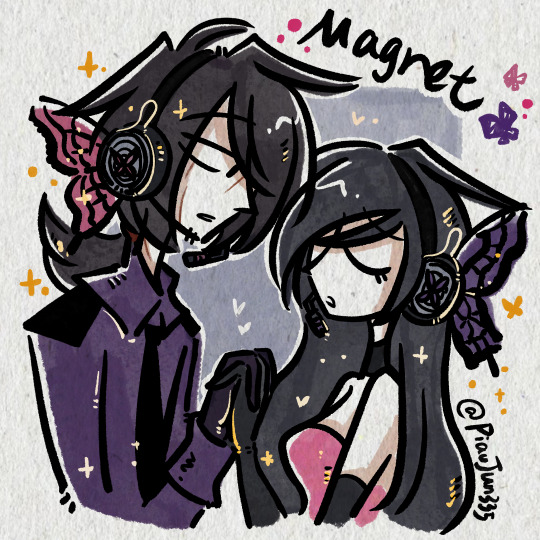
抱き寄せて欲しい確かめて欲しい,
想要被拥入你怀中 想要确认心意,
間違いなど無いんだと思わせて,
让我知道 没有误会了什麼,
キスをして塗り替えて欲しい,
亲吻你 想将我的颜色覆盖上你的唇,
魅惑の時に酔いしれ溺れていたいの,
想要沉醉在魅惑的时刻中,
束縛してもっと必要として,
束缚你 让我对你而言更加必要,
愛しいなら執着を見せつけて,
若是爱就让你看到我的执著,
?おかしいのがたまらなく好きになる,
变得「好奇怪」 是因为无法克制的喜欢上你,
行けるトコまで行けばいいよ,
能到哪里就一起去吧,
迷い込んだ心なら簡単に融けてゆく,
若是迷惑的心 能够简单地消融,
優しさなんて感じる暇など無い位に,
甚至连感受到温柔之类的余裕都没有,
繰り返したのはあの夢じゃなくて,
反覆不断的 并非那个梦,
紛れも無い現実の私達,
毫无疑问地是真实的我们,
触れてから戻れないと知るそれでいいの...
从碰触开始 就知道回不去了 那样就好…,
誰よりも大切なあなた,
比任何人都还要重要的你。
33 notes
·
View notes
Text
2025/05/27
明日計画無痛分娩で入院をする。逆子がなおらず帝王切開かなと思っていたらギリギリでなおってくれた。
でも赤子は小さめらしく、皆からも全くお腹が目立たないと言われてへこむ。私が働きすぎて寝不足が続いたからか?ご飯をあまり食べられなかったからか?インフルエンザにかかってしまったからか?色んな反省点が浮かんでは消え、それなのに予定日より少し早くこの世に搔き出してしまうのか私は、と葛藤している。したところで入院日はもう変わらないんだけど。
里帰り先には陣痛が来たら無痛分娩、という産院は無かったので満足するまでお腹の中に居させてあげられなかったという申し訳なさがある。痛みが怖いので早くこの世に出てきてもらうよ。ごめんね。
そして初めは意味がわからなかったけれど、お腹の中からいなくなるというのは本当に寂しい。今まで一緒だったのが個として切り離される寂しさは想像以上で今からでも自然分娩に変えたくなるほどに寂しい。この気持ちを綴って残しておくことができる語彙を持ち合わせてないのが悔しい。好きだから、とか、可愛いから、とか、小さいからとかそんな理由じゃなく、というより訳もなく居なくなるのが寂しい。早く会いたいという気持ちはなくて、ただただまだお腹の中に居たいだろうに早めにこの世に産み落としてすまんな、という気持ち。
里帰りをしているので両親とよく話すが、2人とも子供である私と弟の生まれた時のことを昨日のことのように鮮明に覚えていて、どれだけ嬉しかったかを何度でも話してくれる。歳を重ねるに連れてこんなにストレートに愛情を表現されることなんてほぼなくなるので、実家に帰るたびに自己肯定感の中でもかなり根っこのほうの自信みたいなものが少し回復する。私も同じように子供のことを愛せるといいけれど、どうしてもテイカー気質からは抜け出せないからな…。
悲しくなるから考えないようにしているけど、健常じゃない場合だってもちろんある。小さめだし、お腹も小さいし、私の妊娠期間の過ごし方も良くなかったし、遺伝的なものもあれば、無痛分娩リスクもある。健常で生まれてきたと思ったら何年後かに障害が分かるケースや、身体障害を負う場合だってある。そんなことをすり抜けてもなお不登校、いじめ、非行、受験、思春期、就職、結婚、子供…と乗り越えなければいけない壁なんか死ぬほどある。そりゃ「ずっと腹の中に居てくれ、居てくれさえすればどんな状況もなり得ないんだから」という感情も渦巻くはずだ。シュレーディンガーの猫をまさか我が子で体感するとは思いもしなかった。
まだお腹の中に居たい(と決めつけている)だろうに、ごめんよ。あと何日かしたらもう君はこの世界に出てくるみたい。本当に愛せるかは全然分からないし、良い親になる自信もない、苦労を沢山かけると思う、真っ当な人間に育て上げられる自信もない、ぶつかるのもしんどいなって思う。言うこと聞かなかったら理不尽に怒ることも絶対あるよ。それでも親になってしまうよ、ごめんね。最大限の努力はするけどあまり期待しないで。こんな後ろ向きで弱気だけど、精一杯頑張ってみるし、自分の命より大切と思う気持ちはあるよ。迷わず自分の命なんか差し出せるし、どっちかが危なくなったら君が生きるんだぞ。では、後ほど。
20 notes
·
View notes
Text
Scan and transcription of the Persona 3 part of Newtype Magazine February 2016
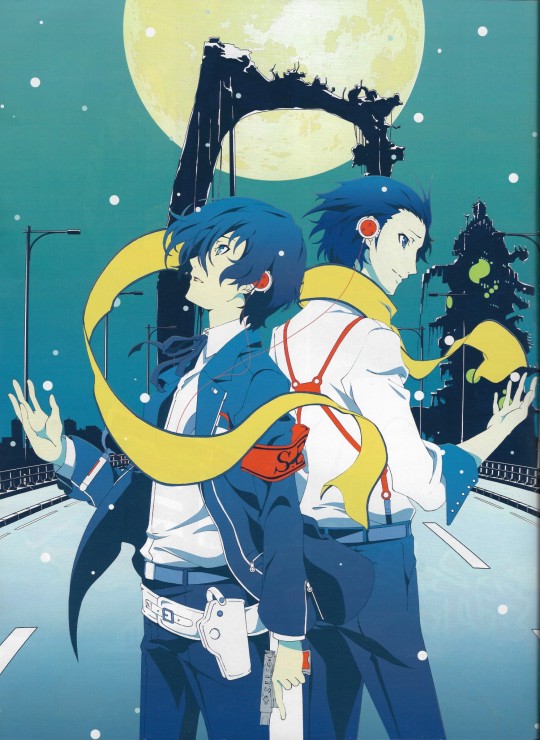

春、夏、秋を経て冬、理が出す答えを見届けて
監督 田口智久
死を見つめる季節のフィナーレに
第1章でコンテ、第2章で監督を務めてこられた劇場版「ペルソナ3」ですが、ファイナル・シーズンである第4章は、どのような気持ちで臨んだのでしょう?
田口 第3章で自分が監督としてかかわっていない劇場版「ペルソナ3」を見ることができたのが、刺激になりました。自分とはまったく違う方法論で構築されていて、僕がやったら確実にこうならないですし、なんというかジェラシーのようなものを感じまして。ああ、ペルソナって、こういうふうにつくることもできるんだ、と。それを受け止めることができたからこそ、第4章では、自分のやり方を突き詰めたフィルムにしなくてはと思いました。あとは、やっぱりフィナーレということでのプレッシャーが大きかったです。
第4章の物語の関となるのは?
田口 理と綾時の関係性ですね。そこヘシャドウの母体であるニュクスが襲来したり、それに伴ってみんなの心がダウナーになって⋯⋯という展開で、ずいぶん重いものになっています。でも、みんなが悩んでいる部分にしっかり尺を取って描いているので、映画ならではの見せ方ができているのでは、と思います。
理にスポットが当たっていきますが、どのように描きましたか?
田口 第3章に、理が旅館の池に落ちて笑うシーンがありますけど、あの理を経ての理をしっかり追っていこうと考えていました。今作では、抱えきれないほどの絶望を前に、悩み、立ち止まってしまうというところまで、みんなが落ちてしまうんですけど、そのなかで理が見つけ出す答えというのが、全4章通してのテーマでもあり、象徴的なセリフになっています。そして、それは、第3章で笑った理がいなければ、たどり着けなかった答えなんじゃないかな、と。
それから、綾時とアイギスも、重要な存在ですね。
田口 すごく極端な⋯⋯本当に超極端な言い方ですけど「綾時と理は両想い。アイギスは理に片想い」っていうのを、こっそり頭の片角に置いてました(笑)。もちろん僕独自の解釈なので、いろんなとらえ方をしてほしくもあるのですが。ただ、そうやって、アイギスがヒロイン然としているわけではないからこそ、ペルソナならではの仲間感が出る、というのもあるんですよね。
理と綾時に重点が置かれていくとなると、その二役を演じられている石田彰さんのアフレコもすさまじいものになったのでは。
田口 石田さんだけ別の週に理以外の綾時を中心とした声を録らせていただいてから、全体アフレコの週に理としてみんなといっしょに録らせていただいた感じなんですけれど、本当にすばらしかったです。演技に対するストイックさが本当にプロフェッショナルで、ご自身で「今のは少し綾時が出てしまったから」とリテイクを申し出てくださったり。
全体的にも、とてもスムーズなアフレコになったそうですね。
田口 圧倒的にスムーズでした。特に今回は静かなシーンが多くて、感情的にセリフを吐くような場面はほとんどないんですけど、その淡々とした空気感を成立させるのは難しいはずなのに、自然にスッとやってしまえるのがこのチームの方々の成せる技。こんなに研ぎ澄まされた現場は、なかなかないのではないかと。
細かな心情描写という意味では?画づくりにもこだわられたのでは?田口監督の描き出すダウナーな情景描写が楽しみです。
田口 カッティングが終わった後に、編集さんに言われたひと言が「暗っ!」でしたからね(笑)。刺されて死ぬとか大惨事が起こって死ぬとかのサスペンス的な死ではなくて、非常に観念的な死についての物語なので、精神的にどうやられていくかというのを、どう表現するかが��題で。光や色味の演出であったり、降ってくる雪の量で表現していきました。アニメで雪が降りつづけている作品もあまりないんじゃないかと思うんですけど、心情とマッチさせたいなあというところで、力を入れています。作画もすごいアニメーターさんたちが集まってくださっていて、誇張された動きというよりはリアル寄りの芝居をていねいに描いてくださっています。全然動いているように見えないところにも実は枚数が割かれていて、作画枚数もこれまででいちばん使っているんですよ。
最後に、今作を描くうえでの最大のポイントだったと考えるシーンを教えてください。
田口 ラストですね。それは第4章を担当すると決まったときから、見据えていたビジョンでもあります。第1章の春からともに季節を経てきた理と仲間たちが迎える、そのラストを見届けてほしいです。
#1 Spring of Birth
1日と1日のはざまに隠された影時間。そこにはびこる怪物・シャドウに襲われて、無気力症となってしまう者が町に続出していた。対抗できるのは、ペルソナという特殊な能力をもつ者だけ。春、私立月光館学園に転校してきた結城理は、ペルソナの力に覚醒し、同じくぺルソナの力をもつ者たちが集う特別課外活動部へと引き入れられる
#2 Midsummer Knight's Dream
夏休みに屋久島旅行に向かった特別課外活動部。そこでアイギスという女の子に出会う。彼女は対シャドウ特別制圧兵装のラストナンバーであり、なぜか理のそばにいることを望むのだった。理たちは影時間の謎を追いながら、さらに新たな仲間と出会い、きずなを深めていく。だがそこにストレガと名のる者たちが現われ⋯⋯
#3 Falling Down
季節は秋。特別課外活動部は、影時間を終わらせるため、シャドウや滅びを望むストレガとの死闘を重ねていた。ある者は仲間や家族の死と向き合い、ある者は護るべき者に気づき、ある者はこれまでの戦いの意味に葛藤する。そんなとき、理の前に謎の転校生、望月綾時が現われる。その出会いの先にあるものは⋯⋯
「PERSONA3 THE MOVIE #4 Winter of Rebirth」
●1月23日土全国ロードショー
●第3章Blu-ray&DVD 1月20日水発売
WEB▶http://www.p3m.jp/
Twitter▶@P3movie
illustrated by YUKIO HASEGAWA, finished by SAORI GODA
background by BIHOU, text by HITOMI WADA
©ATLUS ©SEGA/劇場版「ペルソナ3」製作委員会
STAFF 原作=「ペルソナ3」(アトラス) 脚本=熊谷純 スーパーバイザー=岸誠二 キャラクターデザイン=渡部圭祐 ペルソナデザイン=秋恭摩 プロップデザイン=常木志伸 色彩設計=合田沙織 美術監督=谷岡善王(美峰) 美術設定=青木薫(美峰) コンポジット&ビジュアルディレクター=高津純平 編集=櫻井崇 音楽=目黒将司、小林哲也 音響監督=飯田里樹 第4章監督=田口智久 制作=A-1 Pictures
CAST 結城理=石田彰 岳羽ゆかり=豊口めぐみ 伊織順平=鳥海浩輔 桐条美鶴=田中理恵 真田明彦=緑川光 山岸風花=能登麻美子 アイギス=坂本真綾 天田乾=緒方恵美 荒垣真次郎=中井和哉 イゴ ール=田の中勇(特別出演) エリザベス=沢城みゆき
#persona 3#p3#ryomina#that tag's deserved i think#'Ryoji and Makoto are in love with each other. Aigis' feelings for Makoto are unrequited'#insane
104 notes
·
View notes
Text
夏のアツさを吹き飛ばす!Gフェス開催!完成披露試写会イベントレポート
この度、7月25日(火)に『Gメン』完成披露試写会を実施!岸優太、竜星涼、恒松祐里、矢本悠馬、森本慎太郎、りんたろー。、吉岡里帆、高良健吾、尾上松也、田中圭、瑠東東一郎監督の総勢11名が登壇しました!

イベントが始まると、会場では色とりどりのレーザーが飛び交い、キャストの紹介映像が上映。ザ・クロマニヨンズによる主題歌「ランラン」が鳴り響くと��が上がり、高さ2.5mもある「G-MEN」巨大モニュメントをバックに、キャストと監督が登場しました。壇上に据えられた大階段から降りて舞台へやってくると、ド派手な演出で登場した総勢11名を前に、観客の熱気と歓声は最高潮!場内は一気にお祭りムードに!
最初に登壇者全員から自身の役紹介とともに挨拶があり、その後本編に関する質疑応答へ。1年G組の5名の仲の良さや、高良・田中・松也から見たG組メンバーの様子、癖のあるキャラクターを演じた吉岡の心境、岸から見た先輩達への印象、瑠東監督よる作品への想いや、本作の撮影秘話などが語られました。また、みんなからの無茶振りに、岸が渾身のGメンギャグを全力で披露する場面も!
続いて、フリップへ記述し質問に答えるコーナーでは<自分が演じた役以外で演じてみたいのはどのキャラ?><友情・ケンカ・恋愛と青春がギュッとつまった『Gメン』ですがズバリみなさんの青春を一言で表すと!>というお題に対して出演者がコメントしました。
さらに、岸の呼びかけで、登壇者と会場が一体となり「この夏は、Gメン!」と掛け声をし、キャノン砲が発射!会場は大熱狂の中、イベントの幕が閉じました。
詳しいトークの内容は、8月10日(木)に配信される「Gフェス後夜祭」ダイジェスト映像をチェック!
506 notes
·
View notes
Quote
去年のことなのだが、一国一城の主になることができた。 昼と夜に営業する飲食店を開いた。若い頃から、ずっと関東地方にあるレストランで修行してて、いつかは自分の店持ちたいなー、と思ってた。先輩方は30代後半までにお店を起こす人が多かった。出遅れた感はあるけど、やっと達成できたのが心地よかった。 悩みというのは、「おしぼり業者をどうすればよかったのか?」ということだ。本業に比べれば、なんとも小さいことなんだが、地域でやっていくにあたり最適な業者を選びたかった思いがある。 以下長いけど、経過をまとめてみた。 (以下経過。長いです) 東京で修行して、故郷である京都市内でお店を開くっていうのが若い頃からの理想だった。 最初は故郷である山科の郊外でお店を開こうと思ってたが、(いろいろ問題がわかって)試行錯誤した結果、祇園にいいところが空いていた。 で、まさに開業をしようという時だった。残りひと月を切ったあたりかな? お店の開店準備をしてると、何かの営業の人がふたり来ていた。「こんにちは。ちょっと、いいですか?」ってプランクな感じだった。見た目は京都スタイルの和風私服だったけど、まあビジネスにもありかなって装いだった。 それまで営業は全部断っていた。自分で調達先を決めていたから。でも、『おしぼり』の会社だったんだ。京都でずっとやってるという。 おしぼりは、当時の自分が失念していた調達先のひとつだった。その時に「うわ、まずい忘れてた」と思ってひとまず話を聞いた。 「オーナーさんですよね。開店おめでとうございます」 という感じで名刺を渡されて、いろいろ話を聞いて、その場では返事をしなかったけど、こんな感じの内容だった。 ・おしぼりのレンタル(リース)をやっている ・長い間営業していて、京都市内の飲食店だとシェアがある ・祇園の半分の店はうちを使っている ・飲食店組合にも話は通してあるので すごいニコニコしていた。嫌な感じはしなかった。 「少し、考えさせていただけます?」でその場は乗り切った。 一応は、東京都内の飲食店に勤めていた過去がある。一部マネージャーの仕事もやってたから、なんとなく嫌な予感がした。最悪、反社の可能性がある。はてな民・増田民の皆様も、ああいう営業で人当たりが良すぎるのは気を付けた方がいい。 『地面師たち』のドラマ見たことある人はわかると思うけど、反社の人って演技力が抜群である。いい人の演技が熟達してるヤツが結構いる。 正直迷った。ちゃんとした業者の可能性も十分あるので。どうしようか迷った結果、飲食店の組合に聞いてみることにした。 京都は飲食店組合が強いと聞いていた。コミュニティが熟成しているのは間違いない。祇園なんて、全体で見ても狭い街である。最短で10分もあれば横断できる。新宿や六本木も狭いけど、一般市街地まで含めたら広い。 ただ、この京都のコミュニティの中で、(反社含めて)いろんな業者がどれほどの力を持っているのか、自分には全然想像もつかなかった。 祇園の飲食店組合(※正式名称は出しません。一応……)に思い切って聞いてみた。長年の経験によるアドバイスがほしかった。 業者が来た経過を説明したのだけど……正直スゲー他人事みたいな表情だった。その初老の役員さんは。 「まあ、○○さんですか。昔からある業者さんやわな」 「聞きにくいんですが、いわゆる、そういう方々なのでしょうか?」 「さあ、どうやろなぁ~祇園も色々あるやんなぁ~答えられん。おしぼりをどこから取るかは、結局、お店が決めることやし。組合がどうこう言う話でもない」 そっけなかった。「お店が決めること」っていうのは、自己責任ということだ。 組合は相談に乗ってくれなかった。絶対あんた情報知ってるやろ。反社かそうでないかくらい教えてくれよ。 ほかの店のおしぼり業者も気になった。 「うちの店の近所である」と断言できるお店が3つだけあった。同じ通りにある。 ただ、そこも教えてはくれなかった。口が重いというか、うちが新参だから気にされてる感はあった。 返答はこんな感じだった。 ・うちは昔から付き合いのあるところに頼んでる。会社は教えられない ・おしぼりなんて、適当に決めたら?(紙おしぼりでもええですよ) ・あなたもお店も、まずはええお客を作らんと。細かいところは後でいい ・どこも似たようなもん。京都府内だったら適当に会社を選んでもハズレはない ・話聞く限り、あなたのお店は高いんでしょう?��しぼりくらい自分で選びや~ なんか、どのお店もよそよそしい感じだった。それはわかるんだよ。近所とはいえライバルなのだから。 私が京都に帰ってきたのはつい先日である。料理の専門学校を卒業して都会に出たのだが、その暮らしの中で京都弁はすっかり抜けて標準語になってた。年に一度は山科に里帰りしていたのだが(京都の人は地元感を気にする)。 あの人たちは核心に触れるのを避けているように感じられた。面倒事に関わりたくないというか。 例えば、鴨川を挟んで真向かいにある木屋町だったら、今でも反社に守ってもらってるお店はある。高瀬川の上流にあるエリアである。第一観光ビルとかグリーンビルとか、昔小学校が建っていて今ホテルになってるとことか、あの周辺が特にそうだ。※たまに足がついて京都府警のお縄になっている 下流のエリアだと、ハイソがお店が並んでいる。同じ木屋町でも、お金持ち向けのエリアである。高瀬川の反対側にも飲食街があるが、そのあたりは残念ながら確信がない。 あきらめたくなかった。当時、一生懸命にどの業者がいいか?を調べていった。 おしぼりや什器といったお客さんが絶対に使うモノは、どこぞの知らない業者から手に入れたくなかった。こだわりがあった。反社など論外。東京で痛い目にあったことがあるからわかるのだ(秋葉原~台東区にかけての飲食街。アキバ冥途戦争はあながち間違ってない)。 ところで、故郷である山科で開業しなかったのは、開店時に「そういう人達」がやってくる可能性が極めて高かったから。木屋町も同様だった。その点、祇園は飲食店組合がしっかりしているからか、明らかにそういう連中が「うちが守ってあげますよ(^^)」みたいに来ることはなかった。 というわけで、食材やメニューや仕入れルートを決め切った後で、細かいことでも一生懸命に調べまくったよ。まな板とか包丁とか、食器とか、キッチンの導線とか、メインでもメイン以外でも、こだわりたかった。何事も最初が肝心だと思ってる。 今になっての感想だが、調べておいてよかったという確信はある。小さいことにも専心するのが事業の基本である。おしぼり業者は、結局インターネットで見つけた大手の無難そうなところにした。 ただ……今になって後悔がある。あの例のふたりで営業にきたおしぼり業者なのだが、彼らは反社ではなかった。正直、まっとうというか、京都市内でも伝統があると断言して差し支えないところだった。 彼らは、「祇園の半分の店はうちを使っている」旨の発言をしてたけど、それはマジかもしれなかった。実際、うちの近所の3店は、その業者からおしぼりをリースしてもらってた。 だったら、なんで教えてくれなかったんだよ!! 最近になって、そのおしぼり業者がもう一度きて、「しょうがないか……」という感じで、ほかの店とリース契約している証拠を見せてもらった。うちが京都と地縁が薄い新参店ということで、特別な配慮をしてもらったのだ。 ※私が失礼にも証拠を要求したのもある 後悔している感はある。実際、今からでも間に合うなら、その会社とおしぼりの契約をしたいと考えてる。ここだけは、明らかに選択を誤った。 けど、今の会社もまっとうな大手企業だし、契約期間1年未満で切るのもちょっとな~という思いがある。 おしぼりって意外と大事なんだよ。今の時期だったら、温かいおしぼりと、冷たいおしぼりが選べる店があるかと思うんだが、どっちにも適応できる神おしぼりを提供できるリース業者だってある。 あと、食事中もお手拭きや、洋食のナフキン代わりにおしぼりを使うお客さんもいるので、できればいいやつをお店に置きたいのである。 飲食店を開いたのは、「自分の料理で人を幸せにしたい」という確固たる思いがあるからだ。その思いは、開店前も今も変わらない。 だからこそ、全部こだわりたい思いがある。自分でうだうだ悩んでいてもしょうがないので、こちらに相談してみようと思った。その道に詳しい人が増田にはたくさんいるはずだ。 商売とかやってる人でも、会社員の人でも、経済社会に今は参加してない人でも、アドバイスをいただけるとありがたいです。クソバイスになってても読ませてもらいます。
レストラン営業のこじんまりとした悩み
17 notes
·
View notes
Text

幼馴染のお母さんも癌を患っている。
奇しくもうちの母と同じ肺がん。脳転移も同じ。
子供が生まれたことを幼馴染に報告した際にお母さんのことを聞くと、舞台に復帰して頑張ってるとのこと。根治することはないところまできているのに。
凄い。本当に。
連絡したその日が唯一の夜公演でそう遠くない場所で演っていてと何か運命めいたものを感じて仕事をキャンセルして舞台を見てきた。
思えば、幼馴染のお母さんはイタズラすると叱ってくれる少し厳しい、でも優しいお母さんで。
役者として舞台に立つ姿を見たことはなかった。
ちゃんと別の人で。別人に見えて凄いな役者さんはと思った。古臭くて説教臭くてセンスのない舞台だったけど、それだけが光って見えた。
幼馴染姉妹とお母さんと幼馴染の彼氏さんとご飯を食べて昔話をたくさんした。
自分の物語や文脈を地続きのままで、同じように受け取ってくれる人がいる安心感は得難くて、とても家族というものを感じさせてくれた。
幼馴染といるとお互い許されてる感覚があって、怖い。この人と死ぬのも悪くないと思ってしまう。
だから離れたほうが良かったのかな。

奥さんは里帰り中。ビールを2杯だけ飲んだ。
もう少し懐かしい暖かさに酔いたい。ゆっくり歩いて帰ろう。
14 notes
·
View notes
Text

風呂上がりの一杯に台湾啤酒。甘い。

知り合いから里芋を大量にもらいました。さすがに多すぎたので、やまじんさんにもお裾分けしました。
残りは芋煮にすることにしました。肉は牛肉、醤油味で。山形風?
里芋はもっと小さく切ればよかったか、とも思いましたが、これはこれで食いごたえがあります。酒は末廣の山廃純米。最近、こればっかり😅
#芋煮
#末廣酒造
27 notes
·
View notes
Text
D.Gray-man c249 p19-27
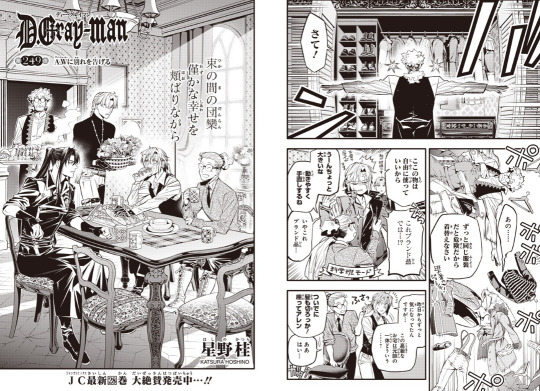
SPOILERS FOLLOW + some translations of what I could gather. Parts, I’m unsure about.

再び無事に会おう Let’s (all) meet again safely.

神田ぁッ Kanda!!
!?
オレをアレンのもとまで届けてくれてありがとうー Thank you for sending me to Allen’s side--!!
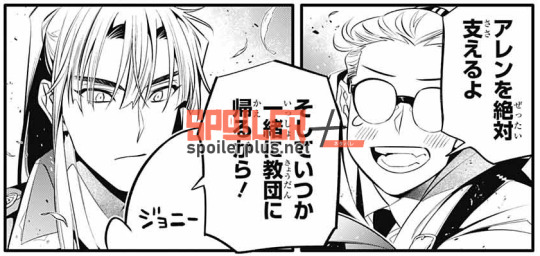
アレンを絶対支えるよ そしていつか一緒に教団に帰るから! I’ll definitely support Allen, and then eventually we’ll return to the Order together! (lit. “one day”)
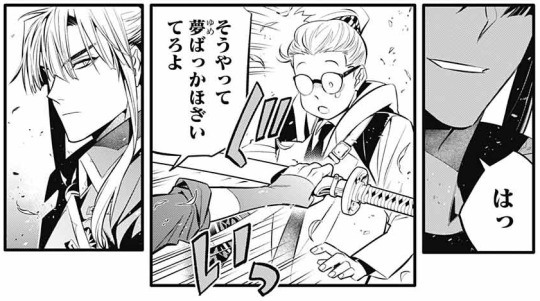
はっ そうやって夢ばっかほざいてろよ Ha. Just keep prattling on about your dreams like that.

...おまえら科学班にはそれが似合ってる ...it suits you Science Department guys.
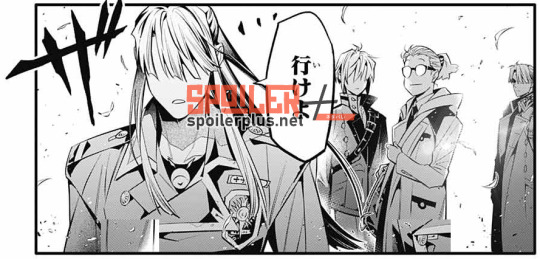
行けよ Let’s go.
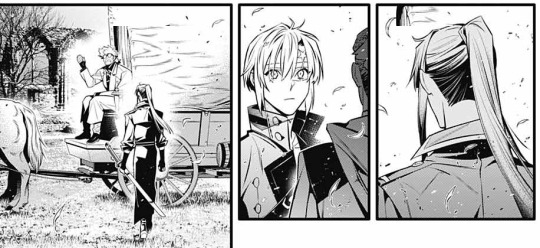

出発しましょうウォーカー Let us depart, Walker.
あ うん... Ah, yeah...

これで本当いいんだね?クロス Is this really okay? Cross.
本当にこれで...Really, just like this...
あの子は行ってしまったよ That child is really gone.
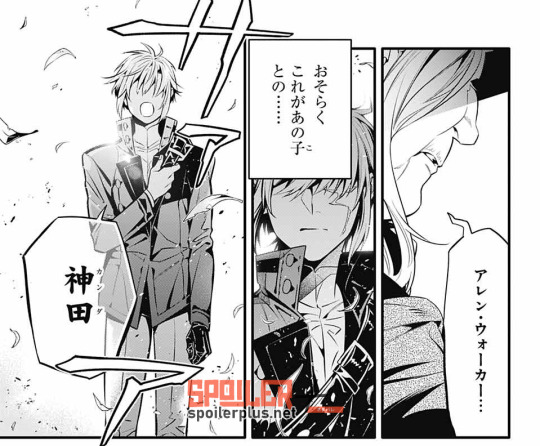
アレン・ウォーカー... Allen Walker...
おそらくこれがあの子との...That child is probably already...
神田 Kanda.
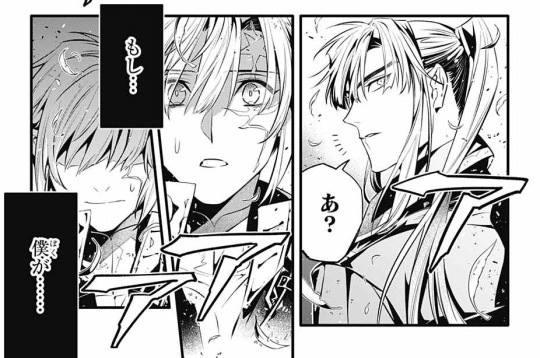
あ? Hm? (lit. Ah?)
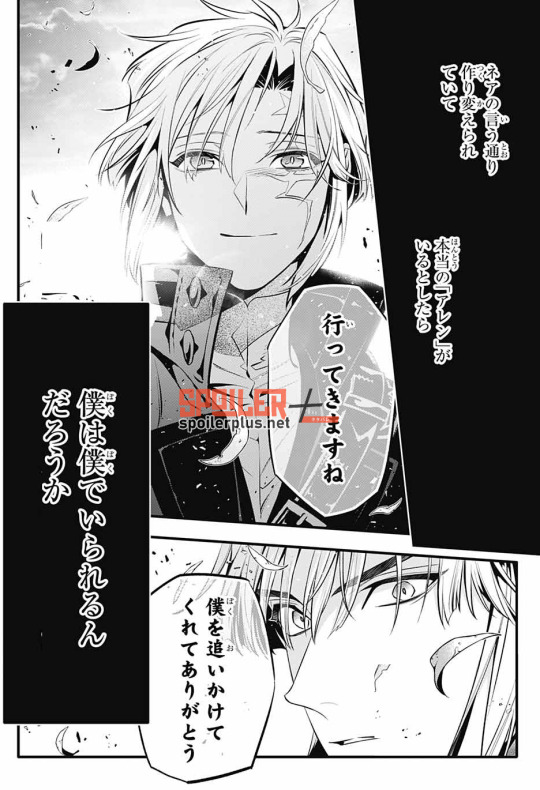
行ってきますね I’m off. (I’ll go and come back.) 僕を追いかけてくれてありがとう Thank you for chasing after me. (くれて means “for me”, so ‘thank you for coming after me for my sake’)
もし... 僕が... ネアの言う通り作り変えられていて 本当の「アレン」がいるとしたら 僕は僕でいられるんだろうか If... I’ve been remade as Nea says, and there exists the real “Allen”, I wonder if I can remain as myself. (lit. Can I remain/exist as me? --I think.)

神よ Oh, God もしおわすならば どうかこの老婆にもクロス・マリアンと同じ罰をお与えください If you’re there, then please grant this old woman the same punishment as Cross Marian.

あの���はもう帰ってはこまい...... That child can no longer return...... ...さようなら...... Goodbye...
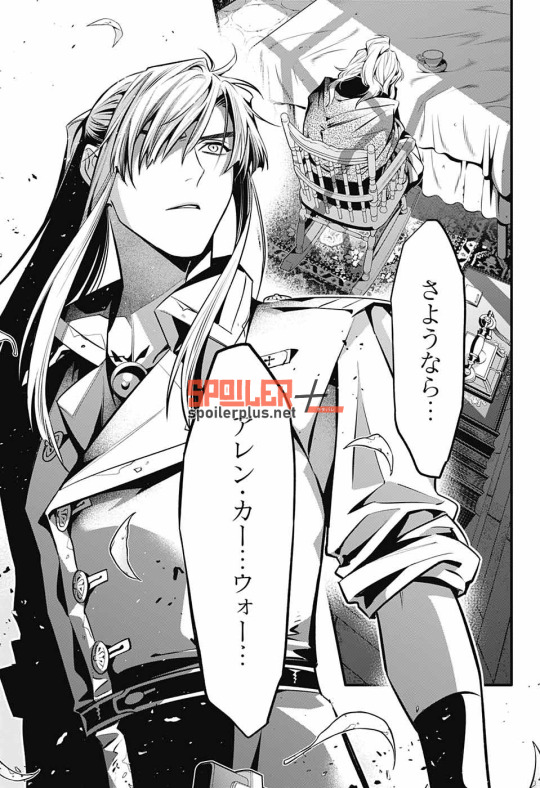
さようなら...アレン・カー...ウォー... Farewell... Allen Walker...

自身への疑念を抱きながら アレン・ウォーカーは一路ズーグル古書店へ向かう待ち受ける真実ははたして何を代償とし誰を救うのか While carrying self-doubt, Allen Walker heads directly to Zoogle Antiquarian Bookstore. What will be the cost of the truth that awaits him, and who will be saved?
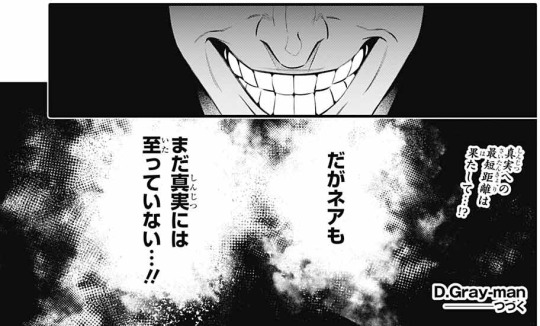
真実への最短距離(郷里)は果た一て...!? The shortest path (furigana: Nea’s birthplace) to the truth is...?!
だがネアも まだ真実には至っていない...!! However, Nea also has yet to reach the truth...!!
207 notes
·
View notes
Text
「山って、標高何メートル以上から言うの?」 そんな素朴な疑問、ありますよね。 実は、国連環境計画(略してUNEP)という組織が、こんなふうに「山地」を定義しています。 それは… 「半径7kmの範囲で、標高が300m以上変化する場所」 「ん? ちょっと分かりにくい…」 ですよね。もう少し噛み砕いてみましょう。 ある地点を中心にして、半径7kmの円を描いたとします。その円の中で、一番低い場所と一番高い場所の「高さの差(標高差)」が300m以上あれば、そこは「山地」と呼んじゃおう!というわけです。 ポイントは、単に「標高が高い」だけではなく、「周りとの高さの差(起伏)」が重要だということ。 だから、標高がそれほど高くなくても、急にグンと盛り上がっているような地形であれば、「山地」にカウントされる可能性があるんです。 もしかしたら、あなたの近所にある、いつも見ているあの丘も、この定義に当てはまる「山地」の一部かもしれませんね!
15 notes
·
View notes
Text
何年か前私はここでインスタントオナニーの話をした。名前の通り手っ取り早い自慰行為なんだけど、今はその逆でタイパより丁寧さに最近力を入れている。手っ取り早くしすぎたせいで、慣れもあったし、なんせ、行為自体早く終わらせなきゃ悪、みたいな思いが勝手に付いてきていた。セックスレスにも繋がるけど、慣れと手っ取り早さを行為に当て嵌めてはいけない。
最近読み始めた本がある。アンソロジー本で『私の身体を生きる』各著者の性や身体に関することがエッセイとして書かれている。私の知らない部分を見入っては圧巻というか関心というか。20代後半になって性に関することで悩んだり通院することになったり三大欲求であると共に切るに切り離せないものだと思っているので、これを機に振り返ってみようと思う。
私の初体験は知らない男だった。知らないというのは素性をそこまで知らずインターネットで知り合った男だった。私は16、向こうは32。家の縛りや慣習に辟易として早く捨ててしまいたいと思っていた。初めて行ったラブホテルは部屋になぜか自転車が置いてあったので今でも印象に残っている。わからないなりに咥えたり喘いでみたりしたけど挿入時は痛みがあった。出血はしなかったことに安心した。その後、大学進学のための上京で欲が爆発した。行為が好きだった、裏にはいつと贖罪があった。好きにさせてしまった、と思えば身体を差し出して許しを乞うてみたり、可哀想だから、と頭ひとつ出て相手を見下している部分もあった。そんな私を知った母親から「私は純潔で父に捧げた」と言われた時は取り戻せない後悔より、だから?と見下していた。
コロナ禍に学生に戻った時なんてTinder無双をした。チンソムなんてしょうもない事もしていた。
欲だから浮き沈みもあって、修論書いていた時は1年間性行為と無縁だった。っていいように書いてみたものの、無双の中で出会った男に無理矢理犯されて痛みと共に下物の色がおかしくなってその時初めて婦人科に行った。M字開脚に放心になりながらも、異形成と知りコルポスコピーも受けた。癌になるかならないかのグレーゾーン判定を受けた時は人生呆気ないかも、と思った。結局なんやかんやで生き延びているし、最近の定期検診も大丈夫だったので適度に生き抜いていきたい。
再社会人になってからも少し遊んでいたが、ピルを飲み始めたら体調が悪くなった。常に気持ちが悪く、欲もどうでもよくなった。丁度その頃付き合い始めた恋人と燃えあがるような想いと行為だったのに、ピルと具合の悪さが続いて花火のように消化してしまった。ちょっとした興味本位もあったのに、なんだかなぁ。
夜になると欲を消化しないと眠れない日々が続いた。冒頭のようにしていたら、上手く達せられなくて、脚ピンの良くない体位でどうにか、を繰り返した。パブロフの犬。
夫婦間のレスの投稿をXかnoteかはてなで読んだ。行為が嬉しさだと気付いたような文を読んだ時は、幸せの先の嬉しさか、嬉しさゆえの幸せか鶏卵になった。
飲み会や日常で聞く下ネタに嫌悪を抱いている。どうでもええわ。が核心。勝手に私の知らないところで勝手にどうにかしてください。奥ゆかしさこそみたいなものもある気がする。(知らんがな)
29にして常日頃将来を見つめ直し思い悩んでいる。性もそう。このままじゃと思って伝えたけど、家族になり過ぎる前に妊娠出産を得ないと安寧に縋ってしまうかもしれないと自分自身で思う。この脅迫概念に近しいものは、時期やイベントが過ぎれば呆気なかったなと思うかもしれない。わからないが故に時間と共に杞憂して焦っている。女故の性に囚われてしまっている。
消費期限と揶揄されることがあり、焦るにせよみないにせよ人生80年、100年ある中でなんたる微々たるものよ。
私の性は自分のものでいたいけど、世間的にといい家族といいレールに敷かれる上でぞんざいに扱われている気がする。
23 notes
·
View notes
Text



2024.11.30(土)
今年も年末近しということで、先週家の床のワックスがけ、本日は雨の合間合間ををぬって自動車2台分の冬用タイヤへ交換をした。
これでいつ雪が降っても安心できる。
午後は国民宿舎 鷹巣荘の源泉かけ流しの湯で疲れを癒す。
ところで、最近雨が多くてお出かけするのも躊躇う。北陸らしい天気といえば天気なのだが。
ねむれとか 又さませとか 初しぐれ 哥川
こういう日は俳句のように家でのんびり昼寝をしたり、また本を読んだり、外出するにしてもcafeでぼんやりと過ごしたいとも思うようになった。
本といえば、白洲正子著の紀行文「かくれ里」を読んだ。近江、京都など気になった場所を訪れてみたい。
写真は台湾土産の「COOKIE886」。他にメンマとカラスミも頂いた。
「カラスミ」って初めて食したけれど、味はウニとよく似ていておいしかった。日本酒とも合う。値段は結構お高いようなので、自分では買わない(買えない)。
それといつか行ったcafeの写真。
39 notes
·
View notes